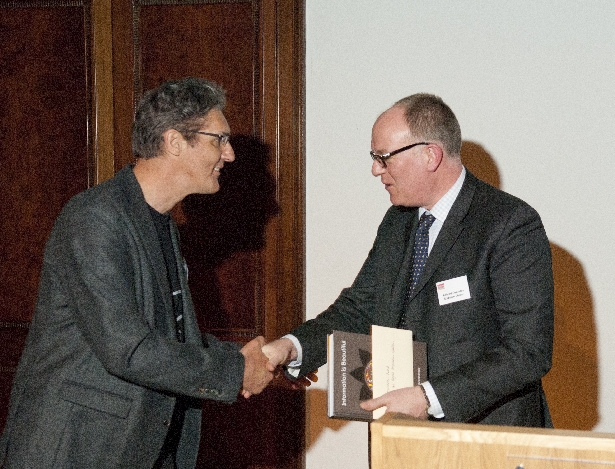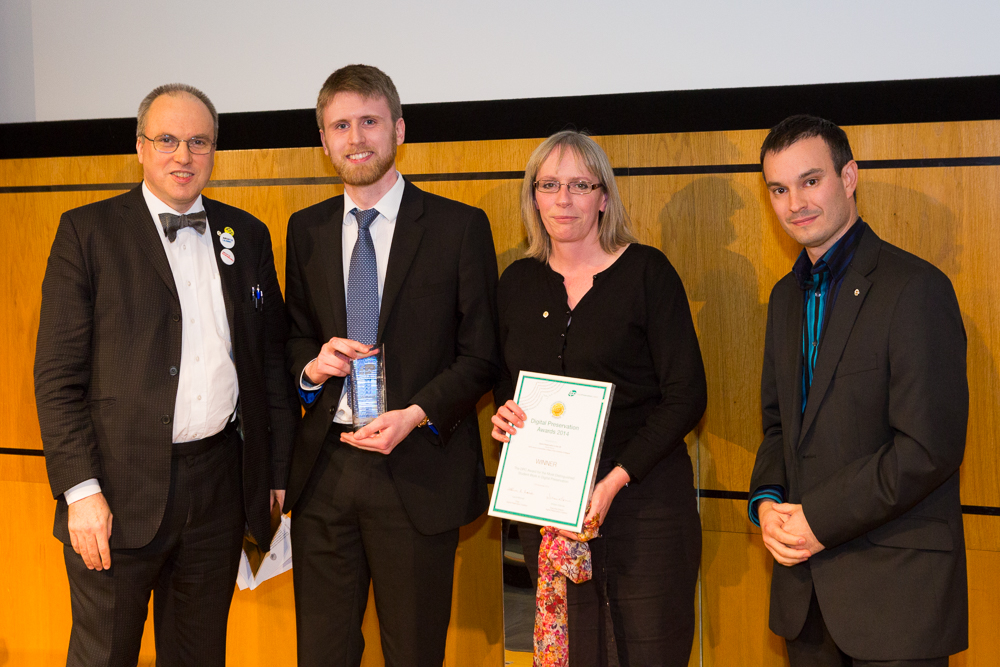DPC
Get help with your digital preservation

Use this to find the assistance you need to do digital preservation, from reference materials to asking the question of others
There are an almost endless number of challenges in the digital preservation field. Whether it's in depth experience with a particular file format, getting to grips with emulation, or writing a business case to fund your preservation work, it's unrealistic for a single person to have all the experience and answers needed. Getting support and advice from a subject specialist or simply someone who's been there, not succeeded first time, tried again, and learned the lessons can often make a real difference. That's where the DPC comes in. This is our guide to seeking help with your digital preservation challenges.
What makes a good digital preservation question?
Digital Preservation is a complex topic at the centre of a whole range of different issues. A solution to a particular problem is often a compromise between technological, resourcing and organisational factors. We often joke amongst the DPC Team that the answer to every digipres question is "it depends". The more serious point behind this observation is that there is usually no one answer that suits all. Which file format, which tool, what process, who should be involved, which issue is the priority...? All these questions depend on the context. What is being preserved, who created it, who is it being preserved for, what is the legal context, and many more issues are essential to understand before an appropriate approach can be identified.
If you're asking a digital preservation question, try and provide as much of the relevant context as possible, to allow an answer to be tailored to your specific situation. Much of this organisational and contextual knowledge is often taken for granted by the questioner, but is essential to understand for those giving help.
Digital preservation, as is often noted, is also a moving target. Some digipres questions will address areas where there is established good practice. Others will be at the cutting edge of understanding with perhaps little evidence or experience to inform advice. In these cases it may be necessary to have a broader discussion, perform research or perhaps trial different approaches before guidance can be arrived at. What constitutes a good answer now, may be completely out of date within a short period of time. Having a thorough understanding of *why* a particular approach is recommended, will help to inform future decision making.
What makes a good answer to a digital preservation question?
In this busy and resource constrained world in which we live, the best answer to any question should be a clear, simple and straightforward prescription that can be easily implemented. Or is it? If the context to a question is critical (see above) then perhaps the answer itself could more usefully be about the broader process and the broader understanding behind any specific answers. The response to many DPC member queries is more often than not a dialogue that takes in the wider issues and context and explores different solutions or approaches. A two way discussion (or ideally, a multi-way discussion with other members as well) can help take a member towards a solution that's appropriate for them, and give them the understanding to maintain and develop that solution over time as requirements and challenges change. It's therefore helpful to manage expectations, where a simple one sentence question might well not have a simple one sentence answer.
Getting help: Make use of DPC resources
- There is a fabulous wealth of reference material in the DPC Website Knowledge Base. There is a search facility at the top of every page or a browse of the subject tags may be of use.
- We provide detailed guidance on preservation subjects in our Technology Watch publications. Full Technology Watch reports provide in-depth reference information, but there are also short Guidance Notes on specific topics and our Topical Notes series introduces key digital preservation topics in easy to understand 2 page primers.
- The DPC's Digital Preservation Handbook includes a contents page that can also be a handy route for browsing to useful sources of information.
- Engaging across your organisation (and beyond) and building the case for digital preservation is often a challenge. Our Advocacy page provides pointers to help in this area, including our Executive Guide and Business Case Toolkit. The Policy Toolkit and Procurement Toolkit then provide guidance on moving forward from engagement success to digipres implementation.
- The digipres.org site pulls together a whole host of community sourced information about digital preservation and has a handy front page listing all sorts of useful links.
If you don't find the answers you're looking for then please move swiftly onto the next step...
Get direct help from the DPC
Our DPC staff are small in number, but our member expertise is vast! Contact us and we hope to be able to help. If we can't help, we will most likely know someone across the coalition who will! Here are some options:
- Contact one of the DPC staff - a useful first step, or chat with us in our weekly DPConnect.
- This email address is being protected from spambots. You need JavaScript enabled to view it. (if you're a member and you don't yet have access, please get in touch by email at info (at) dpconline.org). If the question is sensitive in nature, we can anonymously ask DPC members for you.
- Book in some Dedicated Support for Full Members - full DPC members are entitled to up to 5 days of dedicated support per year.
Ask the community
Sometimes it's useful to ask a question in a more public forum, assuming you're happy to share with the wider world. This enables responses to be shared, commented upon by other interested parties, refined, and of course re-used by others in the future. Try the following:
- Digital Preservation Q&A - a question and answer site dedicated specifically to digital preservation
- Digital Curation Google Group - a message board focused on digital preservation with a really active userbase
- Subject specific groups - there are a number of subject specific groups, such as this one focused on PRONOM discussion
Don't forget about the This email address is being protected from spambots. You need JavaScript enabled to view it. email list. Although it's a moderated list intended for announcements rather than discussion, it can be very useful for raising awareness of your work. See the archives here. The ALA's Digipres list is another alternative with a bit of a focus on the US.
University of Bern, Switzerland becomes newest international member of the Digital Preservation Coalition.
Added on 24 August 2016
This month the Digital Preservation Coalition is delighted to welcome the University of Bern, Switzerland as its newest associate member.
The University Library of Bern currently provides books and journals in print and electronic format as well as access to subject-specific databases. The team at Bern also aims to open its archive to the university community, incorporating access to more complex objects and formats in the digital editions it holds.
2007 Digital Preservation Award
Accolade for new tool to save digital archives for future generations as DROID wins the 2007 Digital Preservation Award.

An innovative tool to analyse and identify computer file formats has won the 2007 Digital Preservation Award. DROID, developed by The National Archives in London, can examine any mystery file and identify its format. The tool works by gathering clues from the internal 'signatures' hidden inside every computer file, as well as more familiar elements such as the filename extension (.jpg, for example), to generate a highly accurate 'guess' about the software that will be needed to read the file.
Identifying file formats is a thorny issue for archivists. Organisations such as the National Archives have an ever-increasing volume of electronic records in their custody, many of which will be crucial for future historians to understand 21st-century Britain. But with rapidly changing technology and an unpredictable hardware base, preserving files is only half of the challenge. There is no guarantee that today's files will be readable or even recognisable using the software of the future.
Now, by using DROID and its big brother, the unique file format database known as PRONOM, experts at the National Archives are well on their way to cracking the problem. Once DROID has labelled a mystery file, PRONOM's extensive catalogue of software tools can advise curators on how best to preserve the file in a readable format. The database includes crucial information on software and hardware lifecycles, helping to avoid the obsolescence problem. And it will alert users if the program needed to read a file is no longer supported by manufacturers.
PRONOM's system of identifiers has been adopted by the UK government and is the only nationally-recognised standard in its field.
The Digital Preservation Award of £5,000 is sponsored by the Digital Preservation Coalition. This prestigious Award recognises achievement and encourages innovation in the new and challenging field of digital preservation - simply put, preserving things whose very existence depends on computers. The judges chose The National Archives from a strong shortlist of five contenders, whittled down from the original list of thirteen.
Short-listed for the Digital Preservation Award were:
-
LIFE: The British Library.
LIFE (Lifecycle Information for E-Literature) has made a major contribution to understanding the long-term costs of digital preservation, an essential step in helping institutions plan for the future. Its methodology models the digital lifecycle and calculates the costs of preserving digital information for the next 5, 10 or 100 years. Organisations can apply this process to understand costs and focus resources on those items or collections most in need of them.
http://www.ucl.ac.uk/ls/life/1/conference.shtml -
Web Curator Tool software development project: National Library of New Zealand & The British Library.
The web is a huge and interconnected digital asset with which we are all familiar, and one in which material changes and disappears with frightening regularity. Conscious of this problem, the National Library of New Zealand and The British Library worked together in an international collaboration to build this tool, which supports selective and thematic web-harvesting by collaborating users in a library environment. Swift development over just 10 months enabled it to be released as free software for the benefit of the international web-archiving community in September 2006, from webcurator.sf.net.
http://webcurator.sourceforge.net/ -
Active Preservation at The National Archives - PRONOM Technical Registry and DROID file format identification tool: The National Archives of the UK.
One of the fundamental challenges of digital preservation is to understand the technologies required to access digital information, and plan the actions we will need to take to ensure continued access in the future in the face of constant technological change. Is the software needed to read this document still supported by the supplier, and is the format of this digital movie still readable by most computers? PRONOM is a unique and innovative online service which helps to answer questions like these and includes a knowledge base of technical information about over 600 file formats and 250 software tools, which has been developed by The National Archives to answer these challenges.
http://www.nationalarchives.gov.uk/aboutapps/pronom/puid.htm -
PARADIGM (The Personal Archives Accessible in Digital Media): Bodleian Library, University of Oxford, & John Rylands University Library, University of Manchester.
Personal archives are important components of cultural memory, but inexperience in curating their modern counterparts - e-mail, digital photographs, online calendars, blogs and many more - puts the survival of today's personal histories at risk. The diversity and volatility of digital technology far exceeds that of any medium that creators, archivists and researchers have previously worked with. The Paradigm project has worked with politicians, archivists and researchers to investigate these challenges in an exemplar project so that the archives of significant contemporaries can continue to enrich our history.
http://www.paradigm.ac.uk/ -
Digital Repository Audit and Certification: CRL, RLG-OCLC, NARA, the DCC, DPE and Nestor.
As the number of organisations, both public and private, preserving digital information increases, it becomes important to be able to assess how well they are doing and how well-prepared they are for the unknown challenges of the future. The Trustworthy Repositories Audit and Certification (TRAC) Criteria and Checklist (maintained by the US Center for Research Libraries), the nestor project's Criteria Catalogue and the Digital Repository Audit Method Based on Risk Assessment (DRAMBORA) published by the Digital Curation Centre and DigitalPreservationEurope present complementary methods for the self assessment, audit and certification of digital repository infrastructures.
http://www.repositoryaudit.eu/
The prestigious award was presented in a special ceremony at The British Museum on 27 September 2007 as part of the 2007 Conservation Awards, sponsored by Sir Paul McCartney.
Ronald Milne, Chair of the Board of Directors of the Digital Preservation Coalition, which sponsors the award, said: "The National Archives fully deserves the recognition that accompanies this award."
For more information on the two tools please see: the PRONOM Technical Registry and Digital Record Object Identification (DROID) file format identification.
2007 Judges
-
Kevin Ashley (Chair of the Judging Panel), Head of Digital Archives Department, University of London Computer Centre.
-
Michael Day, Research Officer at UKOLN, University of Bath.
-
Helen Hockx-Yu, Programme Manager, Joint Information Systems Committee (JISC).
-
William Kilbride, Research Manager, Glasgow Museums.
-
Andreas Rauber, Associate Professor, Department of Software Technology and Interactive Systems (IFS), The Vienna University of Technology.
-
Chris Rusbridge, Director, Digital Curation Centre (DCC).
-
Helen Shenton, Head of Collection Care, the British Library.
-
Dave Thompson, Digital Curator, Wellcome Library.
2010 Digital Preservation Award
The Digital Preservation Award 2010 was won by Los Alamos National Laboratory and Old Dominion University for the Memento Project.
The Institute for Conservation and the Digital Preservation Coalition (DPC) are delighted to announce that the Memento Project led by Herbert Van De Sompel and colleagues of Los Alamos National Laboratory and Michael Nelson and colleagues of Old Dominion University, USA, has won the Digital Preservation Award 2010.
‘Memento offers an elegant and easily deployed method that reunites web archives with their home on the live web,’ explained Richard Ovenden, chair of the Digital Preservation Coalition. ‘It opens web archives to tens of millions of new users and signals a dramatic change in the way we use and perceive digital archives.’
‘The ability to change and update pages is one of the web’s greatest advantages but it introduces a sort of structured instability which makes it hard to depend on web pages in the long term. For more than a decade services like the UK Web Archive and the Internet Archive have provided a stable but partial memory of a fragment of the web – but users had no way of linking between current content and earlier versions held by web archives.’
‘The Memento project resolves this by letting users set a time preference in their browser. The underlying technology then deploys basic, under-used features of the HTTP protocol to direct users to whichever archived copy of a website most closely matches their request’.
‘The really impressive part of Memento is how it uses existing and widely deployed content negotiation tools embedded within the architecture of the web to connect users with archives’, commented Kevin Ashley, Chair of the Judges for the Digital Preservation Award. ‘Most of the technology required to make the service work is already widely deployed.’
‘The Memento architecture means you no longer need to search archives or go to a special website to recover earlier versions of pages: with Memento our archives are always, already available. The benefit for users is obvious, but in creating simple access it transforms the value and impact of web archiving. In an environment where web archives are widely used and understood, the creation of web archives will seem less like a specialised or esoteric concern.’
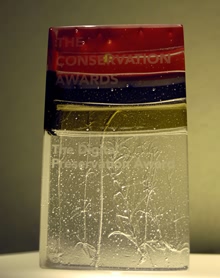 ‘Winning the Digital preservation Award is a really significant achievement’, explained William Kilbride, Executive Director of the Digital Preservation Coalition which sponsored the award.
‘Winning the Digital preservation Award is a really significant achievement’, explained William Kilbride, Executive Director of the Digital Preservation Coalition which sponsored the award.
‘There is no other prize like it, so it attracts genuinely international field and is only awarded after exacting scrutiny. An expert panel subjects ensures a rigorous analysis of each nomination and the whole membership of the DPC is invited to comment on and select their favourite projects. The shortlist, which was announced in Vienna this September included two US-based projects, one Trans-Atlantic blue ribbon task force, a pan European project and an initiative from the National Archives in the UK which gained a huge amount of press attention at the time of the General Election.’
‘To have won the Digital Preservation Award in the context of so many strong candidates should be taken as a significant mark of esteem from colleagues and peers.’
The Digital Preservation Award consists of 4 elements: a cash prize (£2500); a bespoke glass trophy; a miniature of the trophy to be retained by the winner; a certificate which is retained by the winner. Previous winners have included: the National Archives for their Digital Archive Project (2004) with a special commendation for the Camileon project at the Universities of Michigan and Leeds; the PREMIS working group for the PREMIS metadata standard (2005), the National Archives for Pronom and Droid (2007).
Runners up for the award were:
-
Web Continuity: ensuring access to online government information, from The National Archives UK
-
PLATO 3: Preservation Planning Made Simple from Vienna University of Technology and the PLANETS Project
-
The Blue Ribbon Task Force on Sustainable Digital Preservation and Access
-
Preserving Virtual Worlds, University of Illinois at Urbana Champaign with Rochester Institute of Technology, University of Maryland, Stanford University and Linden Lab in the United States
The Digital Preservation Award is one of five awards organised by a working party of the Institute for Conservation (ICON), known collectively as The Conservation Awards. Each award celebrates different aspect of the highest standards of conservation skills, innovation and research, collections care and digital preservation. The Awards, which were launched in 1991, are supported by Icon and sponsored by The Pilgrim Trust, the Digital Preservation Coalition (DPC), and the Anna Plowden Trust. Since 2005, the Awards have also been generously supported by Sir Paul McCartney.
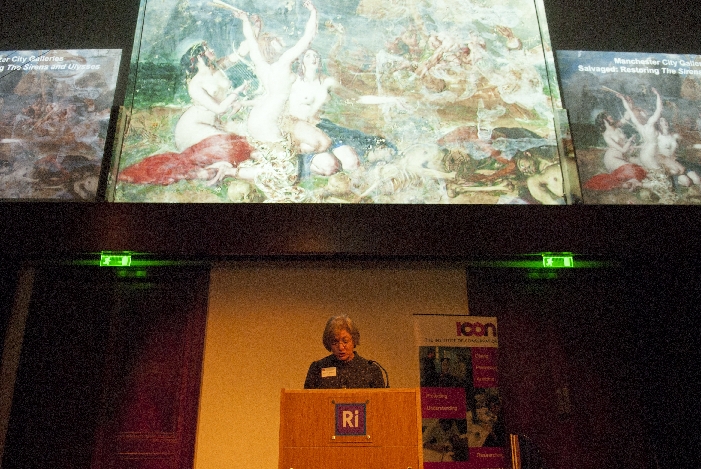
Alison Richmond, ICON CE, commented: ‘In today’s current difficult economic climate, with many of our cultural heritage organisations under threat, it is incredibly important to celebrate the outstanding quality of current conservation and research being undertaken in Britain and further afield today. The winning projects clearly demonstrate that conservation of our cultural is not an end in
The Awards were presented at a ceremony followed by a drinks reception and held at the Royal Institution of Great Britain, London on 1 December 2010. Roy Clare (CEO of the Museums Libraries and Archives Council), speaking at the awards, said: ‘The art and science of conservation are vital to sustaining public understanding and enjoyment of cultural heritage and collections of all kinds, for this and future generations. The profession faces growing demands to respond openly and ever-more creatively to new standards, technologies, public expectations and resource constraints. The context is challenging, but I welcome ICON’s determination to work with members and partners to shape effective strategies for ensuring a vibrant future for conservation.’itself, but a passport to wider access, and deeper knowledge and enjoyment of our heritage. ’
The Judges
-
Kevin Ashley, Director, Digital Curation Centre, Edinburgh University
-
Adrian Brown, Assistant Clerk of the Records, Parliamentary Archives
-
William Kilbride, Executive Director, Digital Preservation Coalition
-
Pip Laurenson, Head of Time-based Media Conservation, Tate
-
Zoe Lock, Lead Technologist, the Technology Strategy Board
-
Eefke Smit, International STM Publishers Association, The Netherlands
-
Dave Thompson, Digital Curator, The Wellcome Library
-
Matthew Woollard, Director Designate, the UK Data Archive
-
Richard Wright, Senior Research Engineer, BBC
Watch interviews with shortlisted candidates:
Digital Preservation Awards 2012
DPC is delighted to announce the winners of the 2012 Digital Preservation Awards.
The Digital Preservation Awards celebrate the excellence and innovation that will help to ensure our digital memory is available tomorrow. It was first awarded in 2004 as one of the Conservation Awards and it has been presented on four occasions (2004, 2005, 2007 and 2010), sponsored by the Digital Preservation Coalition with the Institute for Conservation. Although based on the Conservation Awards the Digital Preservation Award has always been distinctive in how it implements the criteria and eligibility.
At a prestigious ceremony, the Digital Preservation Coalition (DPC) celebrated its tenth anniversary by recognising initiatives and individuals from around the world that have made an outstanding contribution to safeguard digital resources for the future. Three agencies received awards for their exceptional contribution to ensuring the long-term security of digital collections: the University of London Computer Centre for their pioneering and popular ‘Digital Preservation Training Programme’; the PLANETS project for its ground-breaking and innovative technologies; and the Archaeology Data Service at the University of York for its outstanding work securing valuable but vulnerable research data.
The three awards were presented this year were:
-
The DPC Decennial Award for an outstanding contribution to digital preservation
-
The DPC Award for Teaching and Communications
-
The DPC Award for Research and Innovation
Meet the Winners:
Archaeology Data Service
The DPC Decennial Award for an outstanding contribution to digital preservation
Awarded specially to mark the tenth anniversary of the founding of the DPC, the Decennial award recognizes the most outstanding work over the decade that the DPC has existed. An intense international competition followed and finalists from New York, Washington and London were selected after a painstaking assessment by an expert panel. But when Dame Lynne Brindley announced the winner this evening, it was the Archaeology Data Service at the University of York that came out on top. The Archaeology Data Service is an innovative group based in the Archaeology Department of the University of York. ADS has developed and thrived with an innovative business model that allows it to preserve an extraordinary range of data while providing free access to all comers. It ensures the longevity of data that would rapidly be lost or obsolete, and it has an impressive track record of research and innovation.
University of London Computer Centre Digital Preservation Training Programme (DPTP)
The Award for Teaching and Communications
Presented by Oliver Morley, Chief Executive of the National Archives, a small team from the University of London Computer Centre who run the Digital Preservation Training Programme (DPTP) - an entry-level, introductory course that develops critical thinking about digital preservation, received this award. The course is designed to help all working in information management to understand effective approaches to the challenges of digital preservation, and enables students to assess the models and examples in the context of their own organisations.
PLANETS Project
The Award for Research and Innovation
Martyn Harrow, Chief Executive of JISC presented this award to the PLANETS project. PLANETS brought together memory institutions, small businesses, major technology providers, and research institutions from across Europe to build practical services and tools to help ensure long-term access to digital cultural and scientific assets. It established the not-for-profit Open Planets Foundation to provide the digital preservation community with services, ongoing support, and a sustainable future for its Open Source results. It advanced the state-of-the-art in digital preservation and has permanently changed the digital preservation landscape by shifting the focus to practical, sustainable solutions that are soundly supported by practice-driven research.
William Kilbride, Executive Director of the DPC said: “These awards are important in showcasing the creative solutions that have been developed towards digital preservation. Digital preservation is critical. We know that significant parts of the economy, industry, research, government and the public life depend on the opportunities information technology creates, but the rapid churn in technology means data is also surprisingly fragile. We are the first generation that’s had to think about handing on a digital legacy, so we need to act quickly to develop the skills and techniques that will ensure our legacy is protected.”
The contributions of nine other exceptional finalists were also marked in the ceremony hosted by Richard Ovenden, Chair of the DPC and Deputy Director of the Bodleian Libraries at University of Oxford, one of the world’s premiere memory institutions. It is one of many agencies that have joined the Digital Preservation Coalition to help develop the new skills necessary to preserve their growing digital collections.
Digital Preservation Awards 2012 Finalists
|
For an outstanding contribution to Teaching and Communication in digital preservation in the last 2 years:
|
For an outstanding contribution to Research and Innovation in digital preservation in the last 2 years:
|
|
For the most Outstanding Contribution to Digital Preservation in the last decade:
|
|
In different ways, the winners and finalists of the Digital Preservation Awards demonstrate an unassuming creativity that not only deserves to be better known and celebrated: it will be vital for the on-going exploitation of high value data.
The Digital Preservation Awards are sponsored by the Digital Preservation Coalition, which is an advocate and catalyst for digital preservation, enabling our members to deliver resilient long-term access to content and services, and helping them derive enduring value from digital collections. We raise awareness of the importance of the preservation of digital material and the attendant strategic, cultural and technological issues. The DPC is a not-for-profit membership organisation and we support our members through knowledge exchange, capacity building, assurance, advocacy and partnership. Our vision is to make our digital memory accessible tomorrow.
We thank our panel of Judges for their support and contributions to the DPA2012 process:
|
Kevin Ashley (DCC) |
Louise Lawson (Tate) |
Bram van der Werf (Open Planets Foundation) |
|
Adrian Brown (Parliamentary Archives) |
Ant Miller (BBC) |
Paul Wheatley (Leeds University) |
|
Rachel Bruce (JISC) |
Caroline Peach (BLPAC) |
Matthew Woollard (UK Data Archive) |
|
William Kilbride (DPC) |
Dave Thompson (Wellcome) |
|
Digital Preservation Awards Roll of Honour
2022 - Winner of the International Council on Archives Award for Collaboration and Cooperation, presented by Meg Phillips and Neil Grindley
ARCHIVER Project
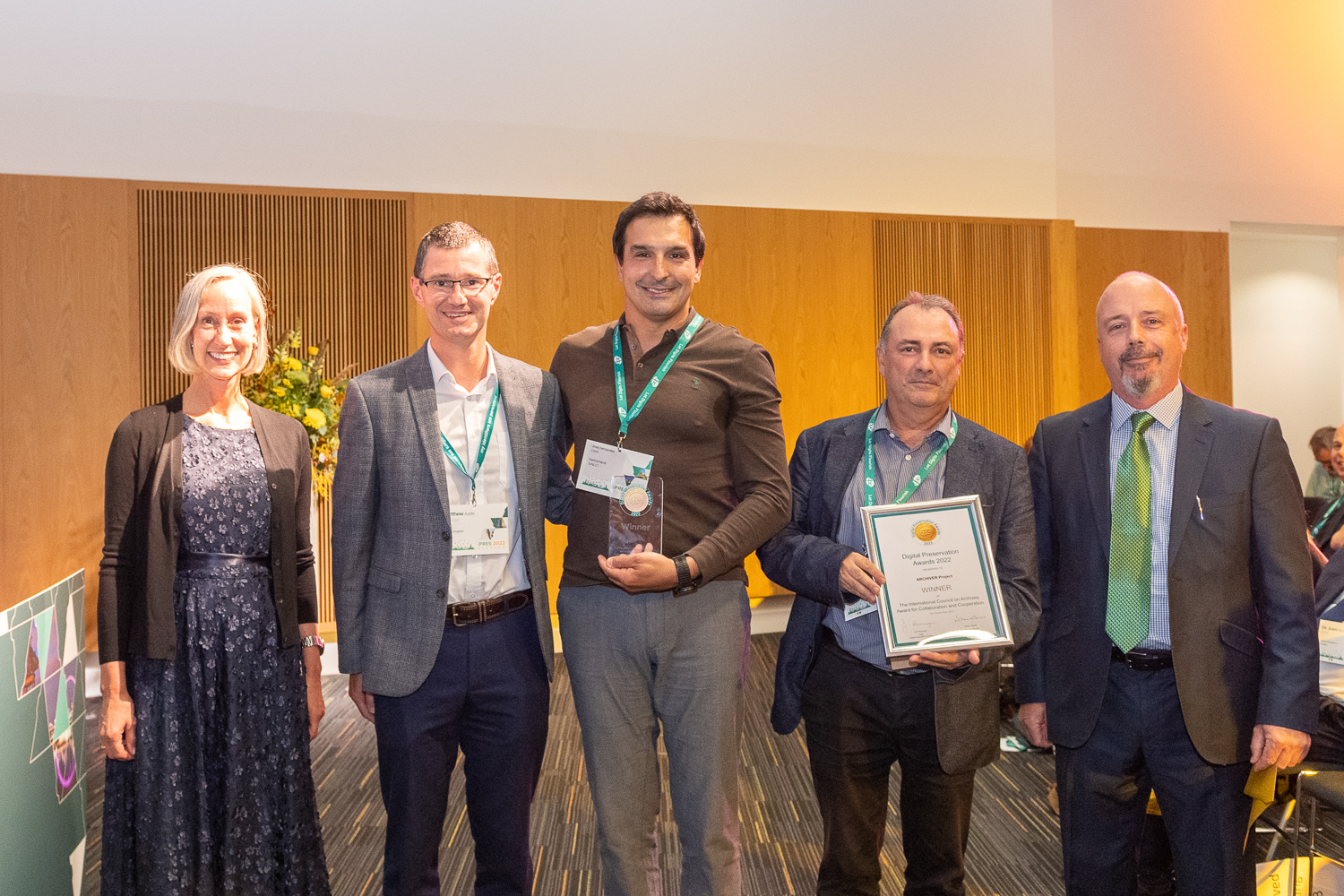
2022 - Winner of the Software Sustainability Institute (SSI) Award for Research and Innovation, presented by Neil Chue Hong and Kirsty Lingstadt
The effective preservation of archaeological virtual reconstructions
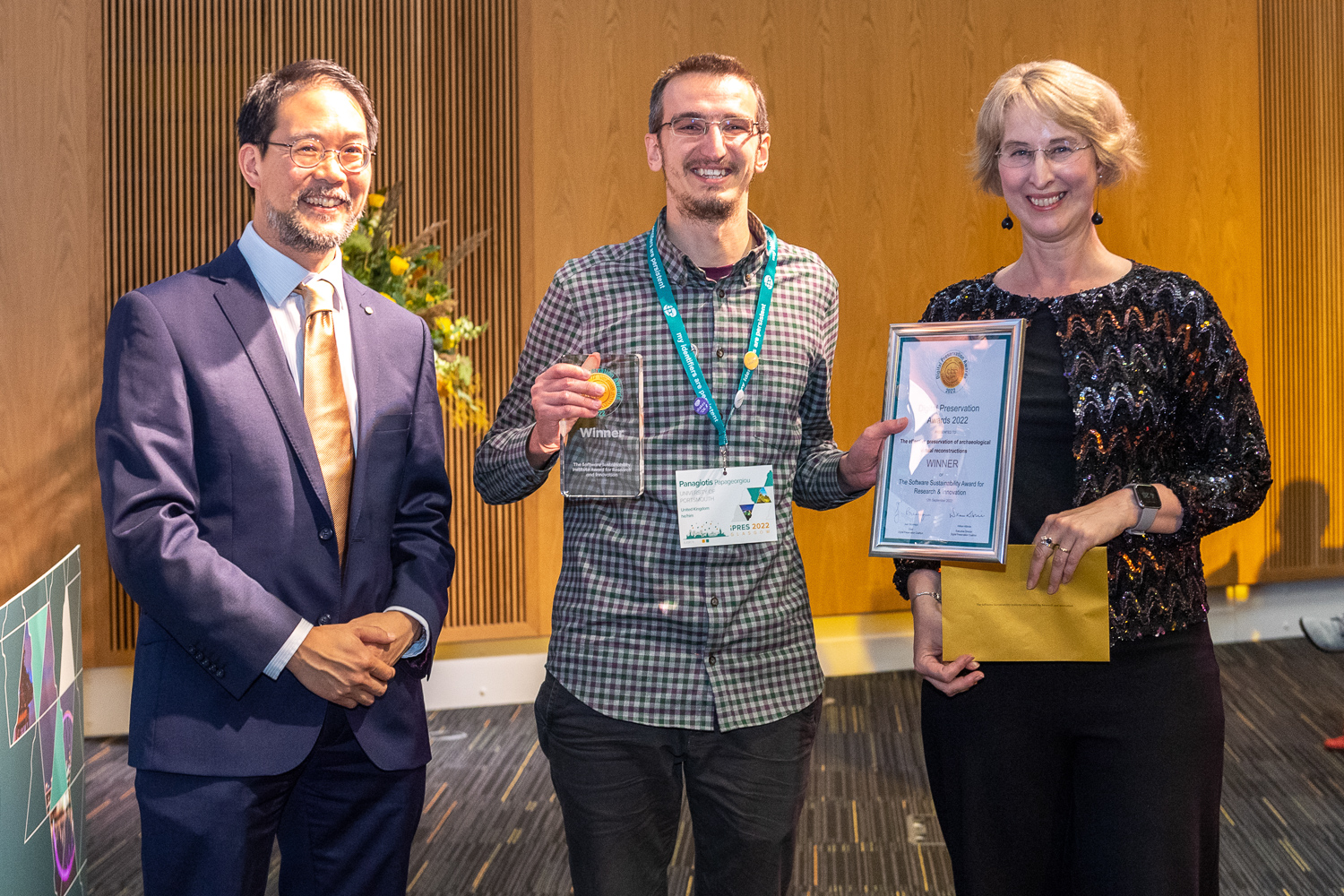
2022 - Winner of the Dutch Digital Heritage Network Award for Teaching and Communications, presented by Remco van Veenendaal and Roxana Maurer
Learning through doing: building digital preservation skills in Wales
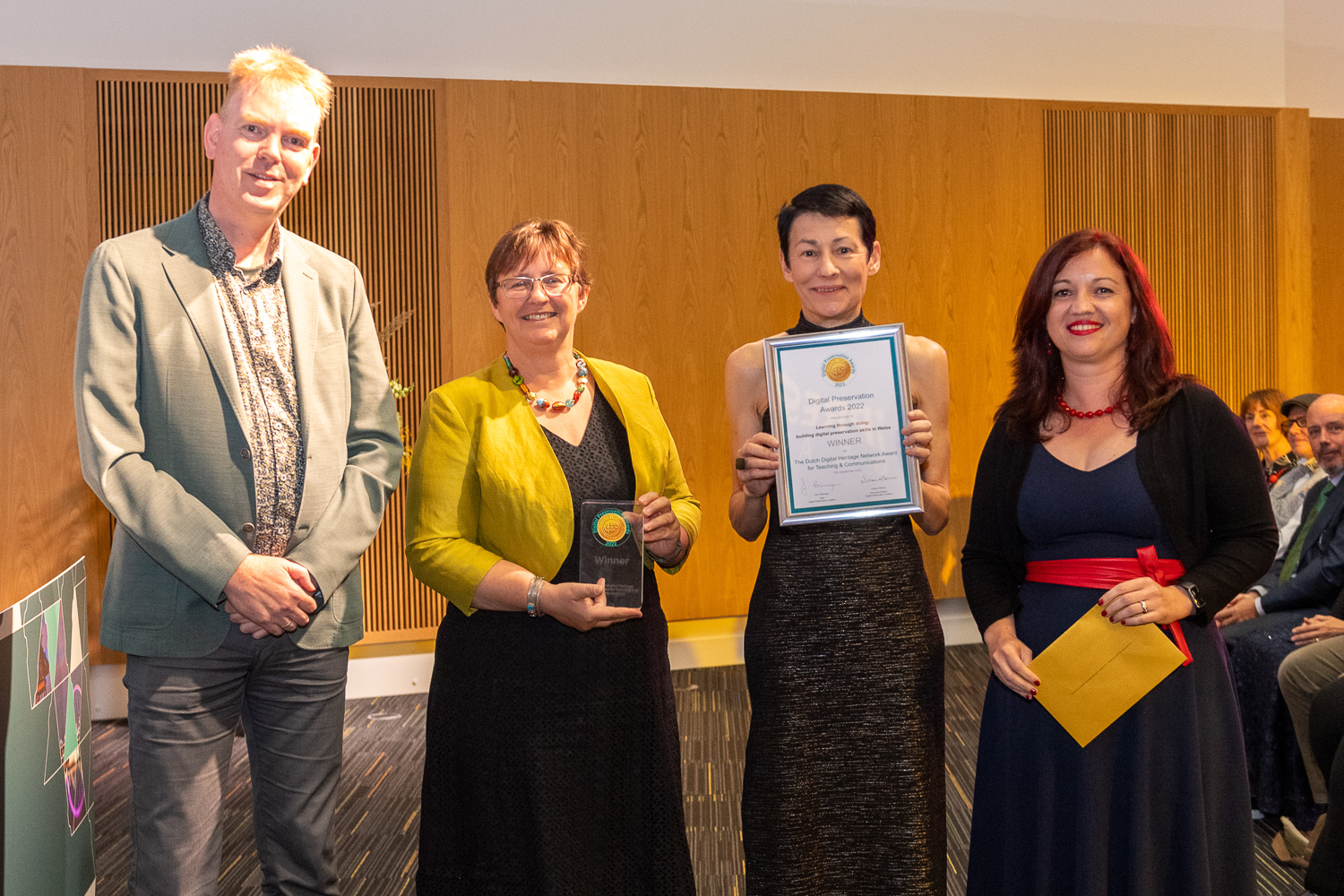
2022 - Winner of the The National Archives (UK) Award for the Most Distinguished Student Work in Digital Preservation, presented by April Miller and Lotte Wijsman
sasha arden with 'Access to Artistic Content on CD-ROMs,' award accepted by Sarah Cook.
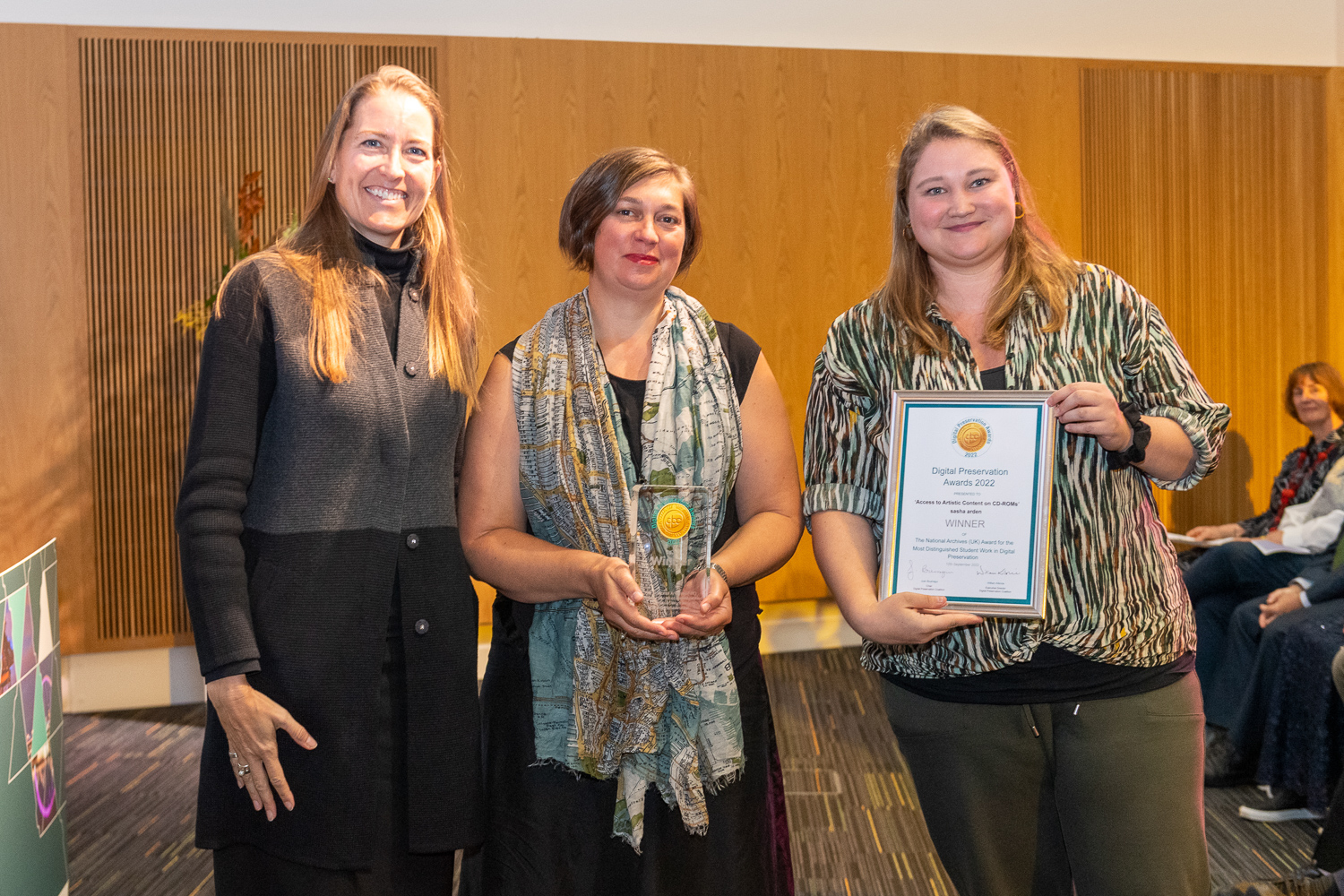
2022 - Winner of the Research Data Alliance Award for the Most Outstanding Digital Preservation Initiative in Commerce, Industry and the Third Sector, presented by Connie Clare and Karen Sampson
National Centre for Truth & Reconciliation Digital Preservation Program
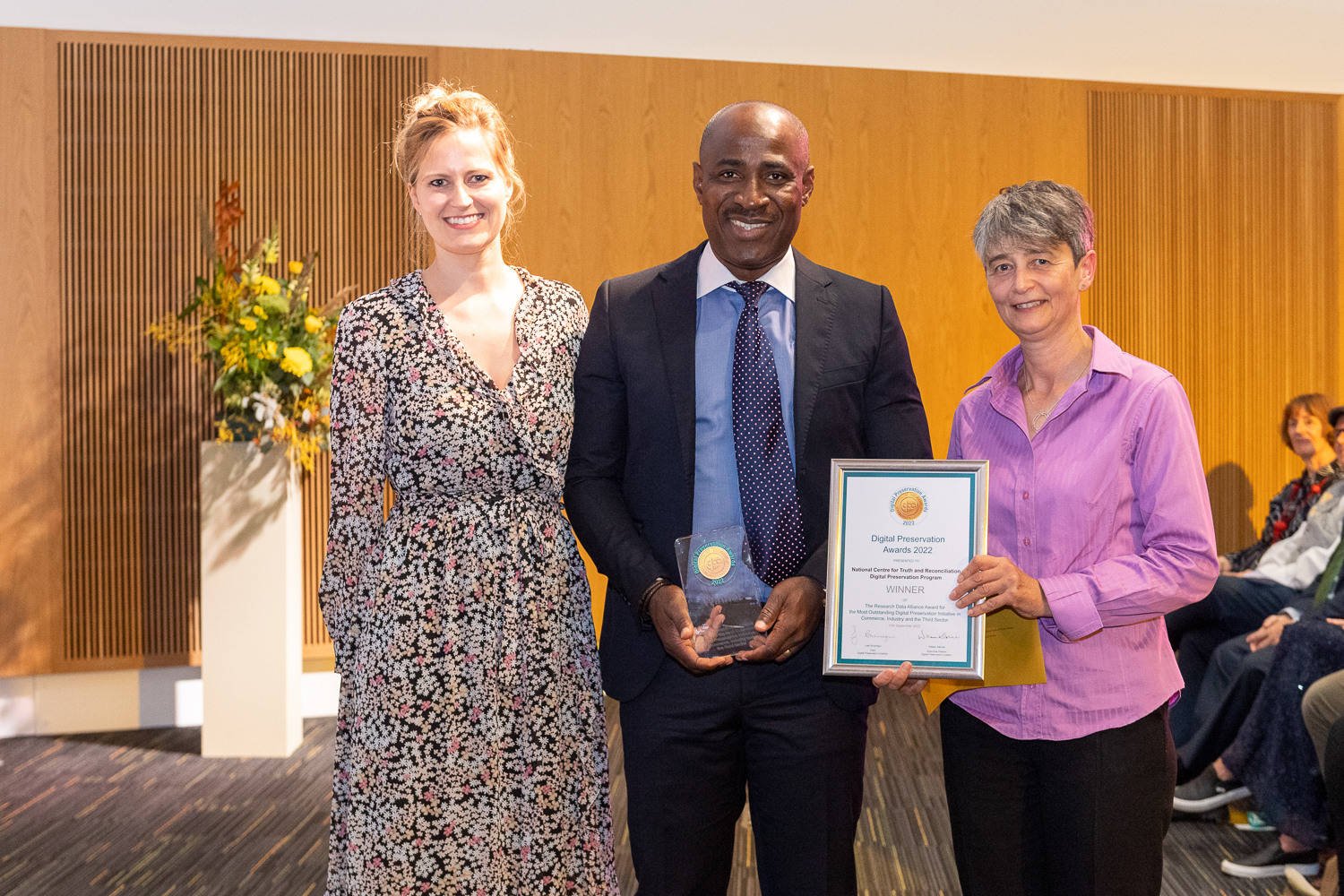
2022 - Winner of the Award for Safeguarding the Digital Legacy, presented by Kieran O'Leary and Patricia Sleeman
Archiving Reproductive Health
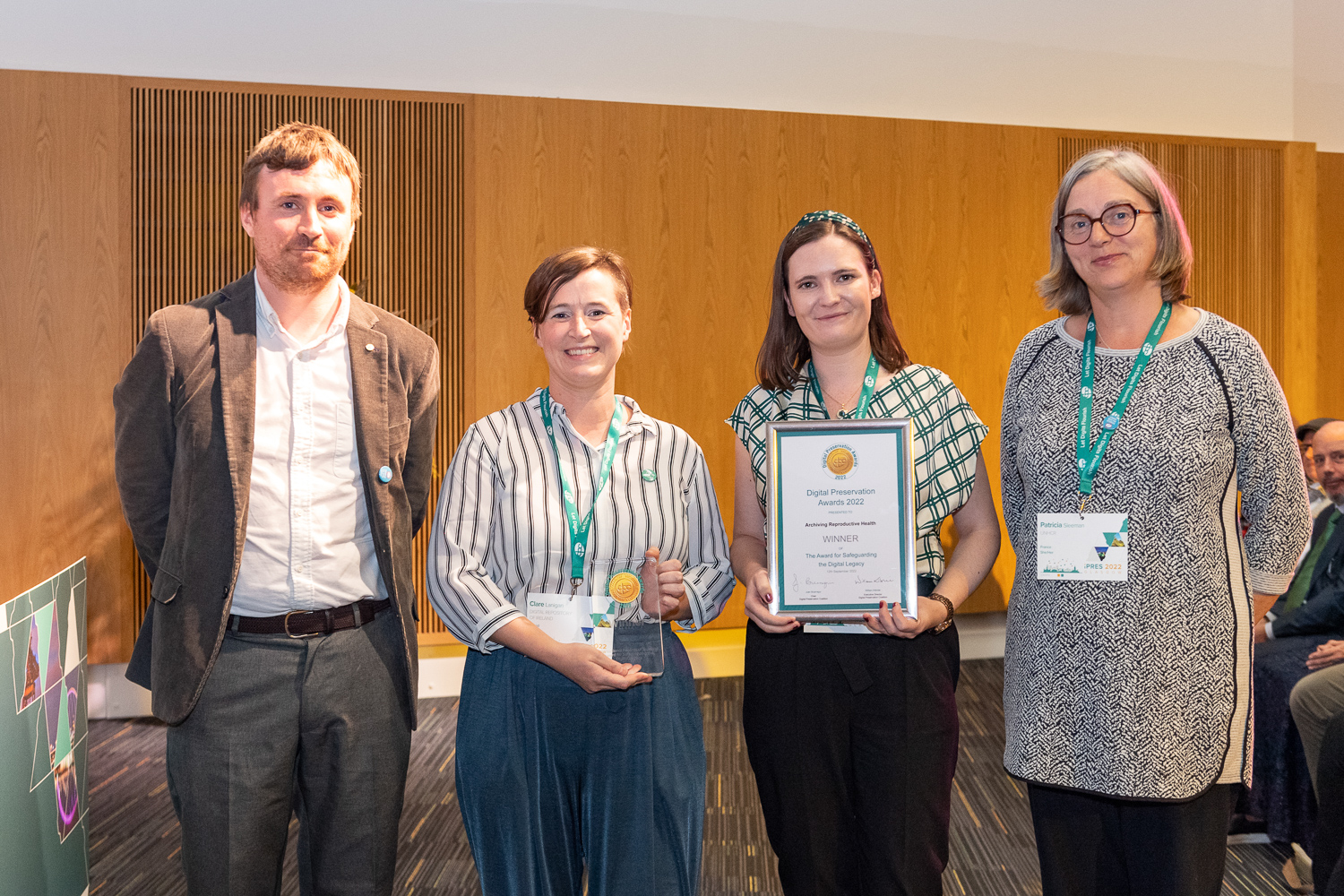
2022 - Winner of the DPC 20th Anniversary Award, presented by Kevin Ashley and Edith Halvarsson
PREMIS Data Dictionary and related resources
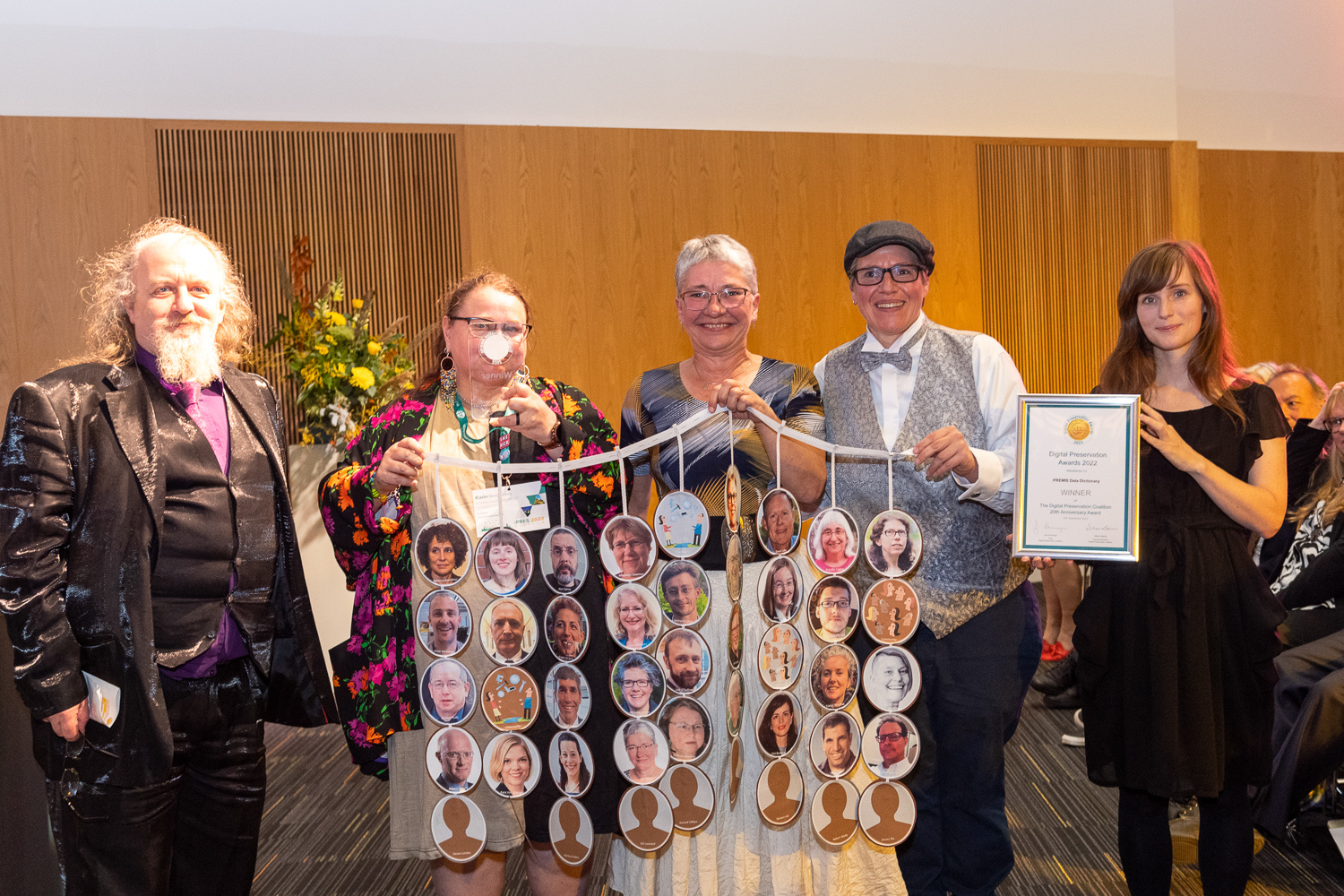
2022 - The DPC Fellowship Award, presented by Micky Lindlar and Barbara Sierman
Left to right (top): Neil Beagrie, Adrian Brown, Dr. Denise de Vries
Left to right (bottom): Nancy Y McGovern, Prof. Zhang Xiaolin
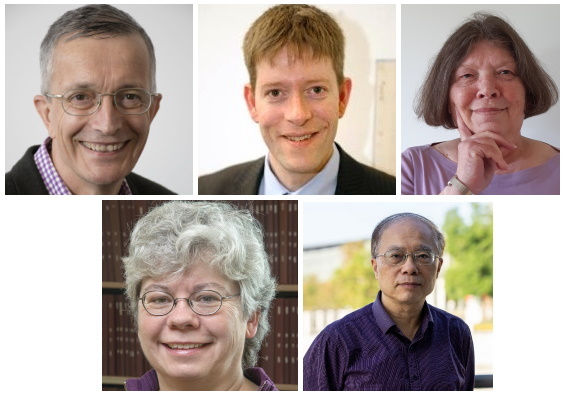
2020 - Winner of the International Council on Archives Award for Collaboration and Cooperation, presented by Anthea Seles and Neil Grindley
NDSA Levels of Digital Preservation Revision Project
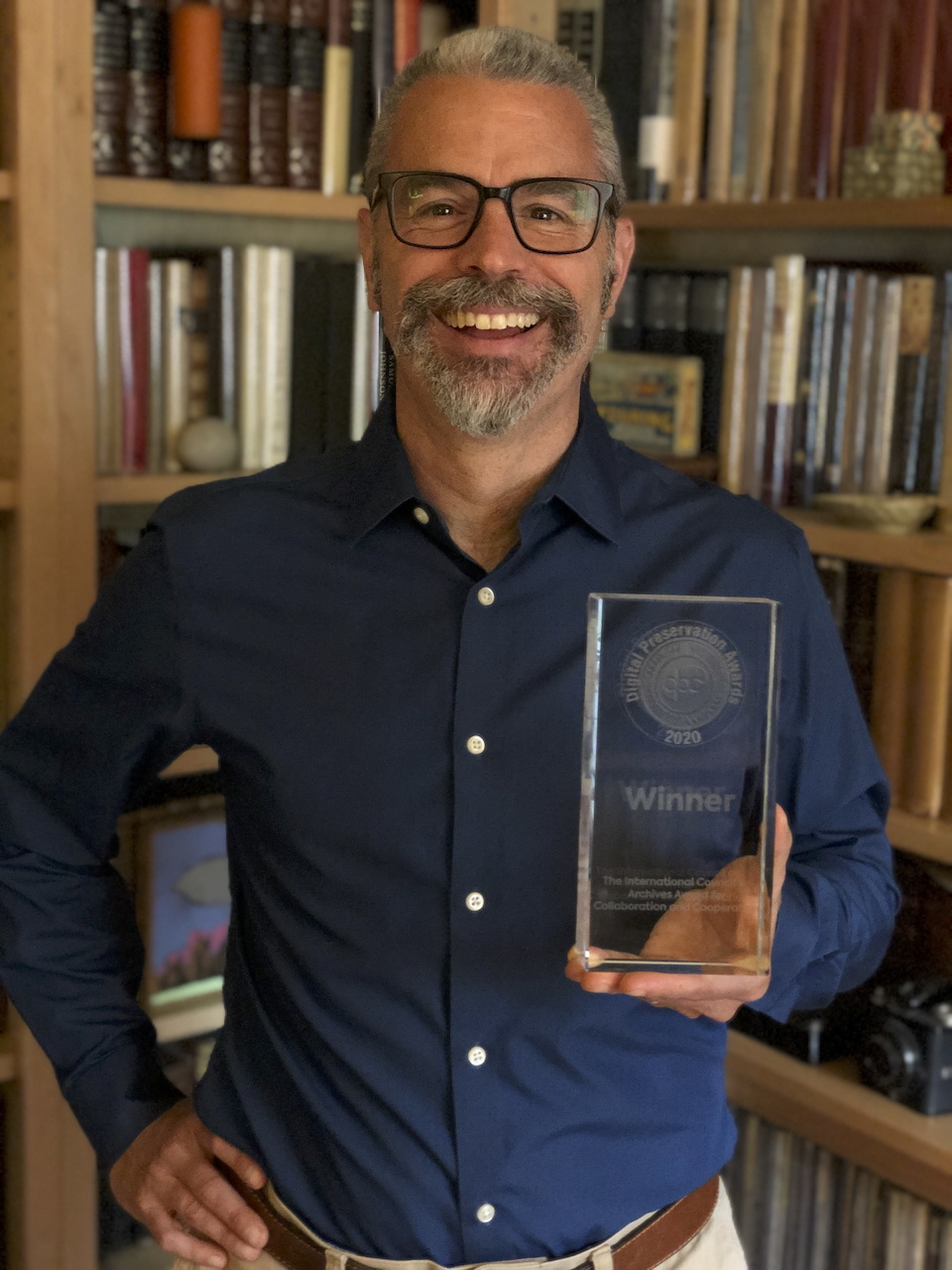
2020 - Winner of the Software Sustainability Institute (SSI) Award for Research and Innovation, presented by Neil Chue Hong and Sally McInnes
Levels of Born Digital Access
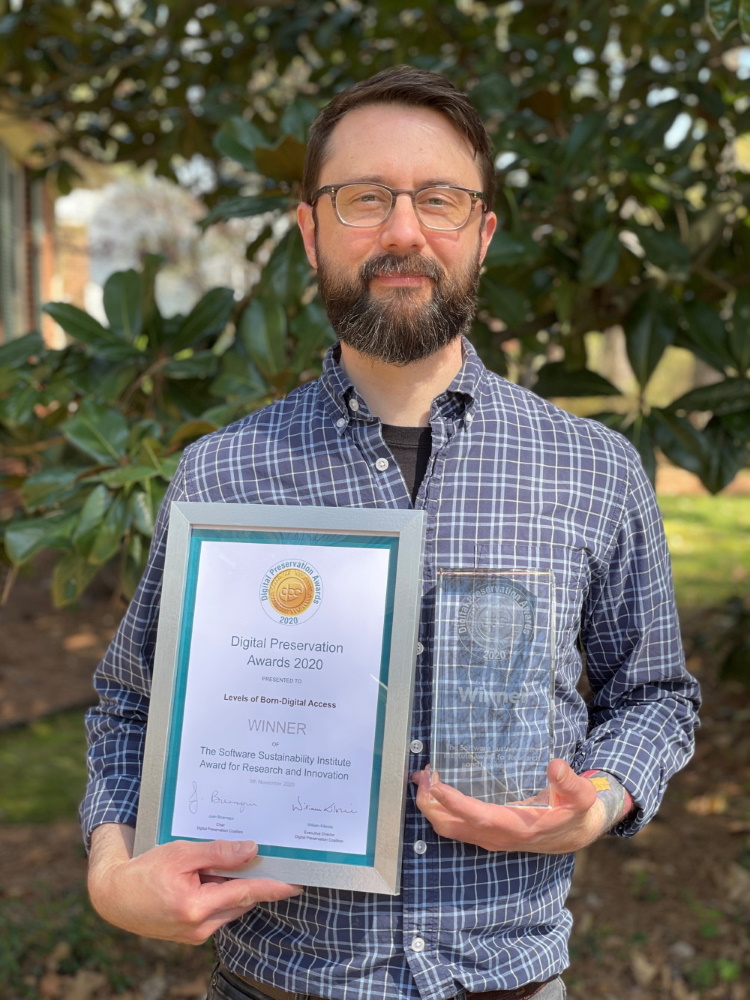
2020 - Winner of the Dutch Digital Heritage Network Award for Teaching and Communications, presented by Marcel Ras and Sheila Morrissey
Digital Records Curation Programme
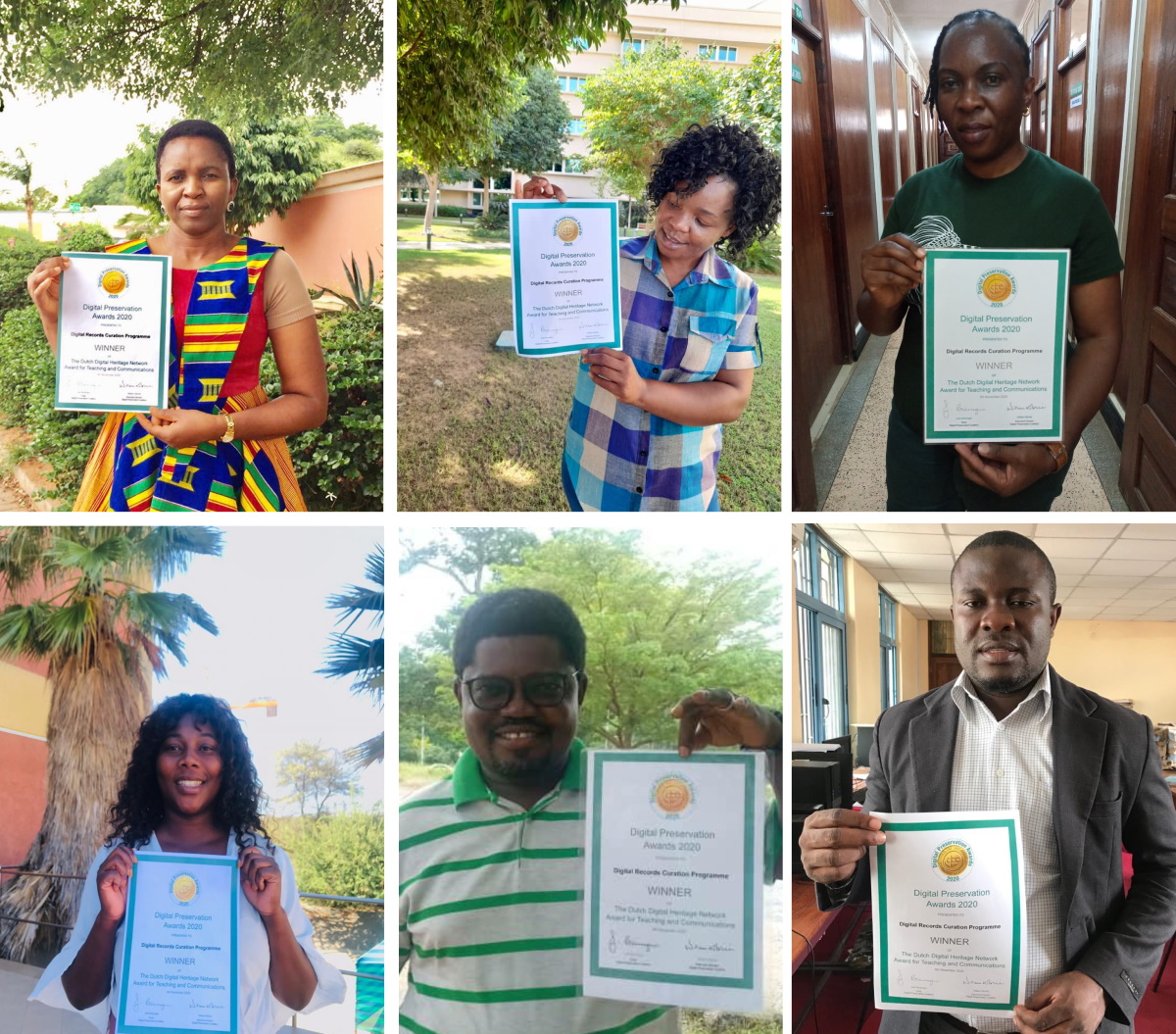
2020 - Winner of the National Records of Scotland (NRS) Award for the Most Distinguished Student Work in Digital Preservation, presented by Susan Corrigall and Angela Beking
Lotte Wijsman with ‘The Significant Properties of Spreadsheets: Stakeholder Analysis’
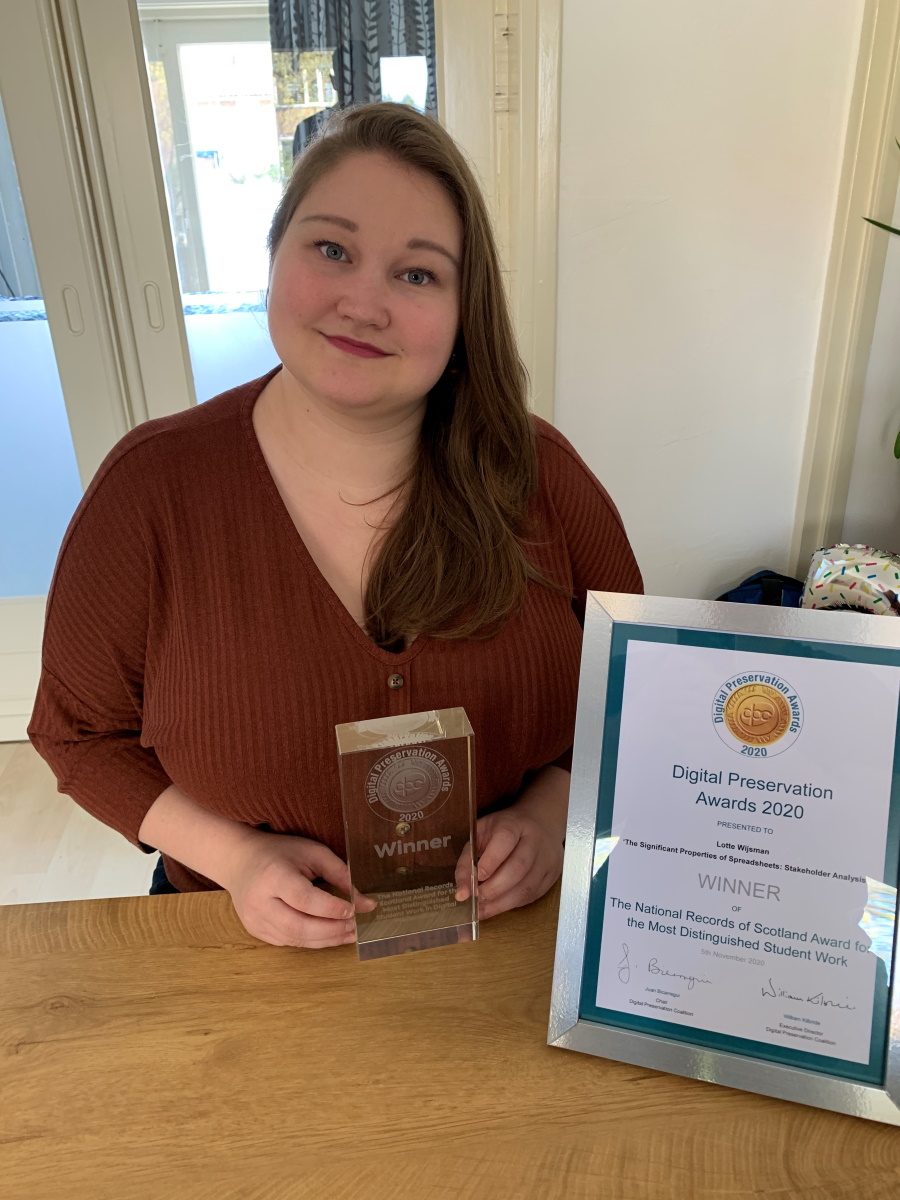
2020 - Winner of the DPC Award for the Most Outstanding Digital Preservation Initiative in Commerce, Industry and the Third Sector, presented by Karen Sampson and Neil Jefferies
UNHCR Records and Archives
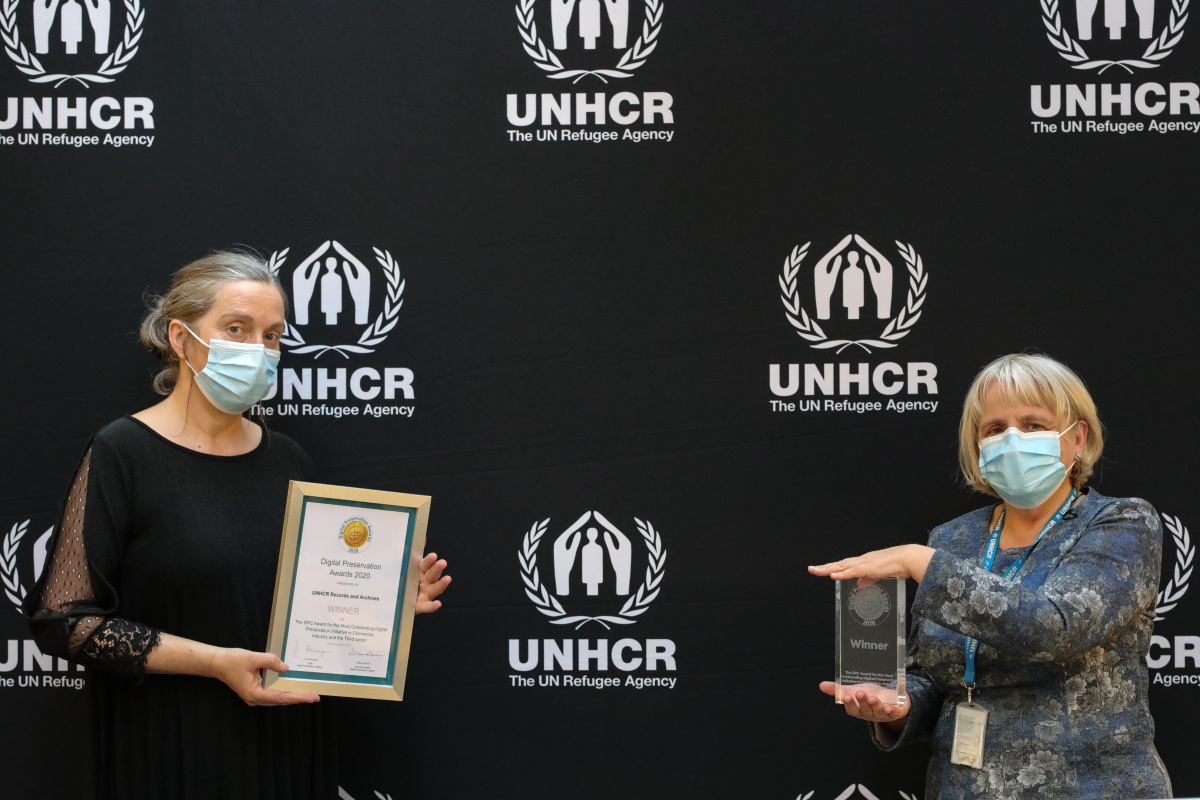
2020 - Winner of The National Archives (UK) Award for Safeguarding the Digital Legacy, presented by John Sheridan and April Miller
UK Web Archive: celebrating 15 years
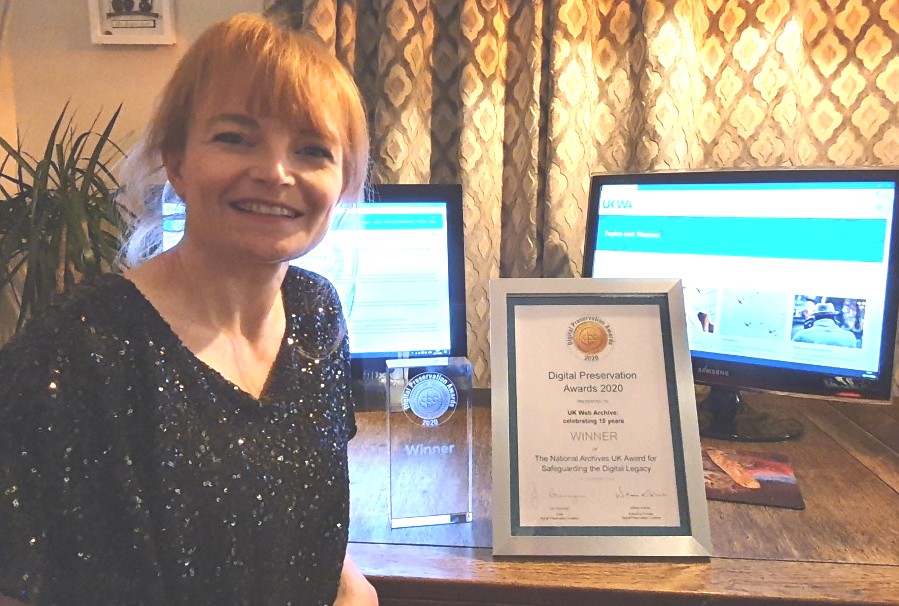
2020 - The DPC Fellowship Award, presented by Richard Ovenden
Micky Lindlar
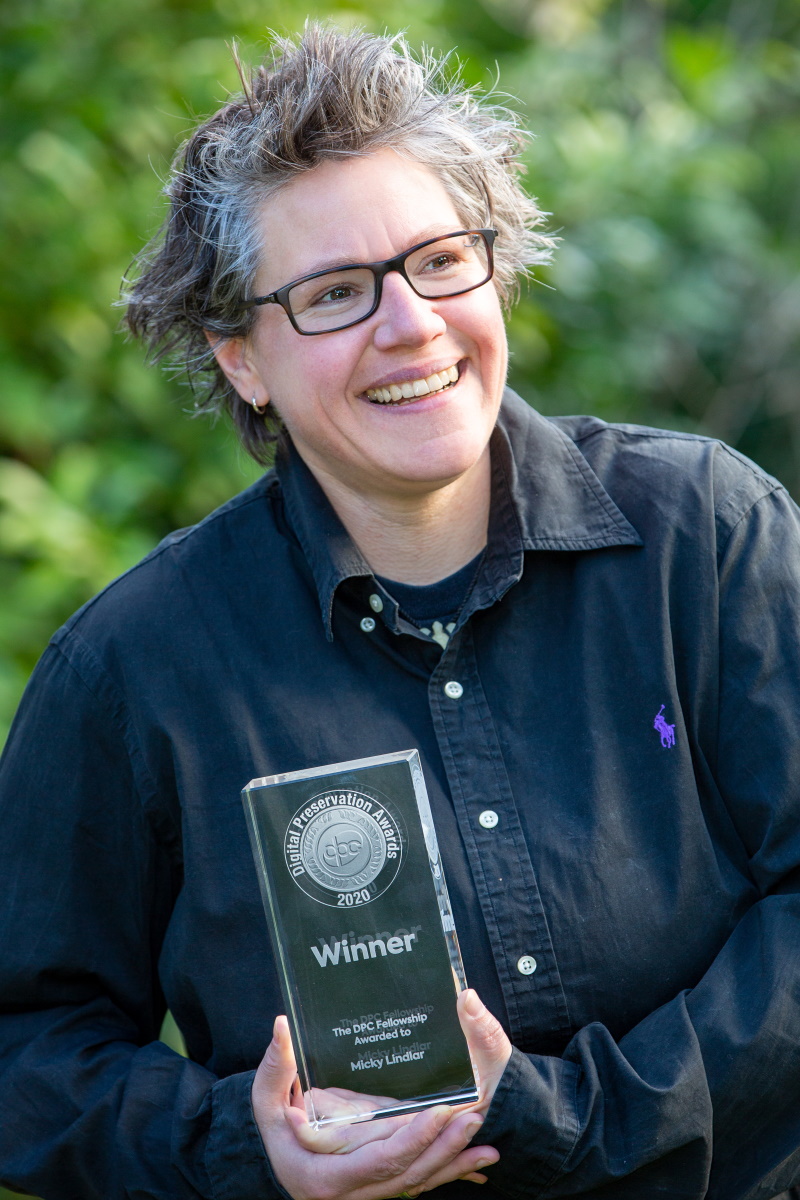
2018 - The Software Sustainability Institute (SSI) Award for Research and Innovation, presented by Neil Chue Hong, SSI and Natalie Harrower, Digital Repository of Ireland
Stanford University Libraries; ePADD
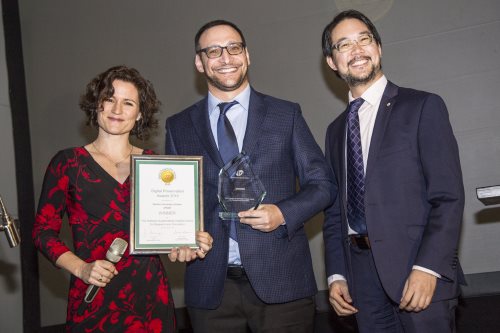
The DPC Award for Teaching and Communications, presented by Sally McInnes, National Library of Wales and Neil Grindley, Jisc
Jennifer Allen, Matthew Farrell, Shira Peltzman, Alice Prael and Dorothy Waugh; The Archivist’s Guide to Kryoflux
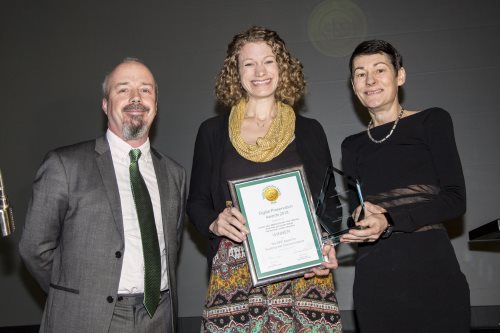
The National Records of Scotland (NRS) Award for the Most Distinguished Student Work in Digital Preservation, presented by Laura Mitchell, NRS and Laura Molloy, University of Oxford
Anna Oates; University of Illinois at Urbana-Champaign
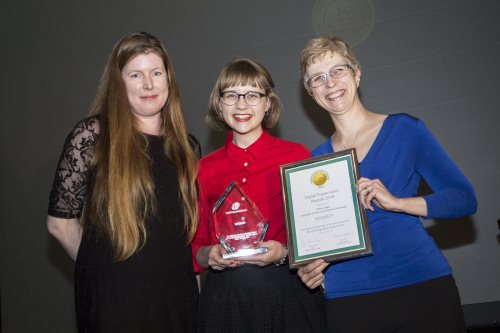
The Open Data Institute (ODI) Award for the Most Outstanding Digital Preservation Initiative in Commerce, Industry and the Third Sector, presented by David Beardmore, ODI and Sheila Morrissey, Portico
Crossrail and Transport for London; Archiving Crossrail
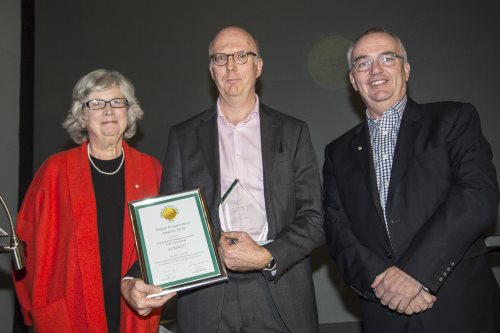
The National Archives Award for Safeguarding the Digital Legacy, presented by Valerie Johnson, The National Archives and Neil Jefferies
IFI Irish Film Archive; IFI Loopline Project
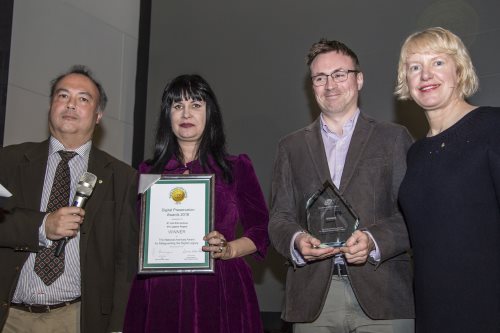
The DPC Fellowship Award, presented by Richard Ovenden, Bodleian Libraries
Barbara Sierman
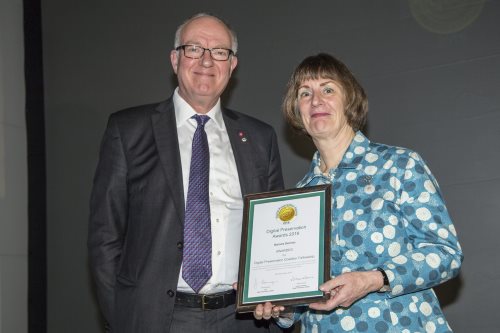
2016 - The Software Sustainability Institute (SSI) Award for Research and Innovation: NCDD and NDE, ‘Constructing a network of nationwide facilities together’ presented by Neil Chue Hong, SSI and Dave Tarrant, ODI
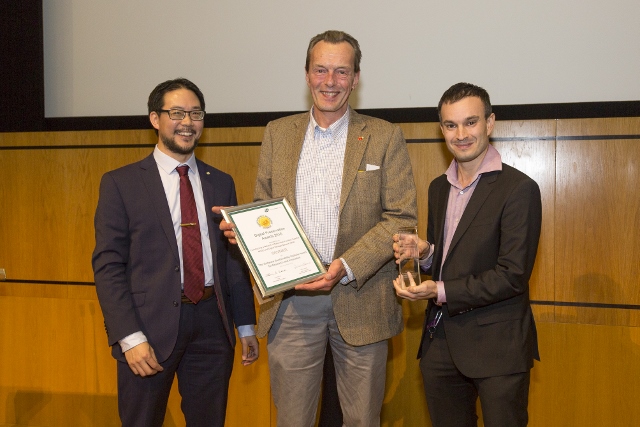
2016 - The NCDD Award for Teaching and Communications: The National Archives and The Scottish Council on Archives: ‘Transforming Archives/Opening Up Scotland’s Archives', presented by Marcel Ras, NCDD and Margriet van Gorsel, Dutch National Archives
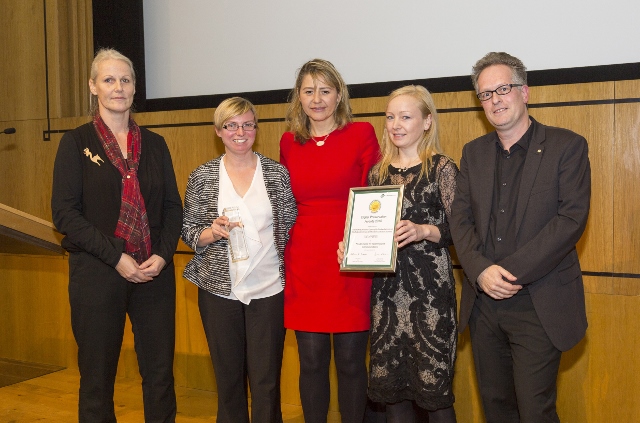
2016 - The DPC Award for the Most Distinguished Student Work in Digital Preservation: Anthea Seles, University College London and ‘The Transferability of Trusted Digital Repository Standards to an East African context’ presented by Daniela Duca, Jisc and Steve Daly, BBC
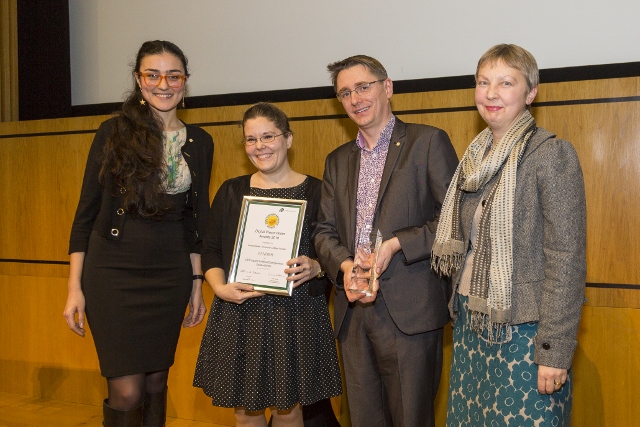
2016 - The DPC Award for the Most Outstanding Digital Preservation Initiative in Industry: HSBC, ‘Global Digital Archive System (GDA)’presented by Tim Gollins, National Records of Scotland and Sharon McMeekin, DPC
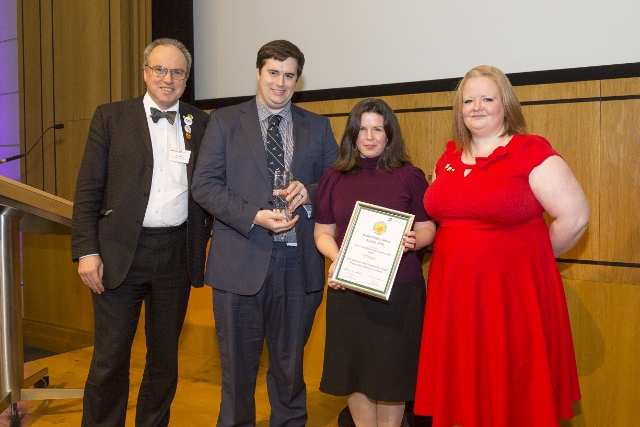
2016 - The National Archives Award for Safeguarding the Digital Legacy: Amsterdam Museum and Partners, ‘The Digital City revives: A case study of web archaeology’ presented by John Sheridan, The National Archives and Louise Lawson, Tate
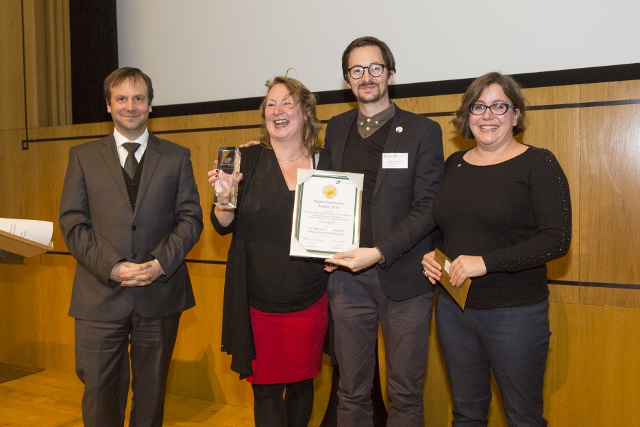
2016 - The DPC Fellowship Award: Brewster Kahle, Internet Archive presented to Chris Booth by Richard Ovenden
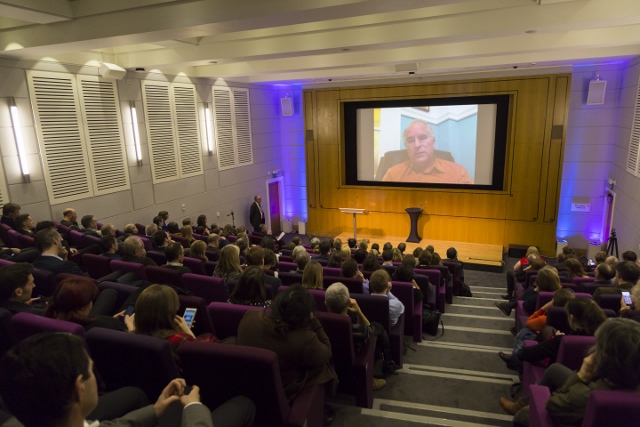
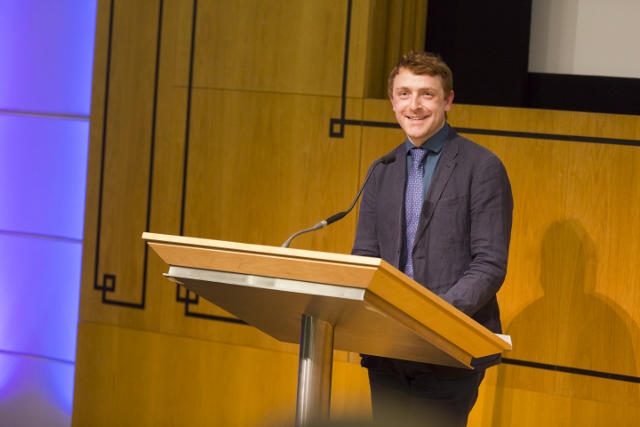
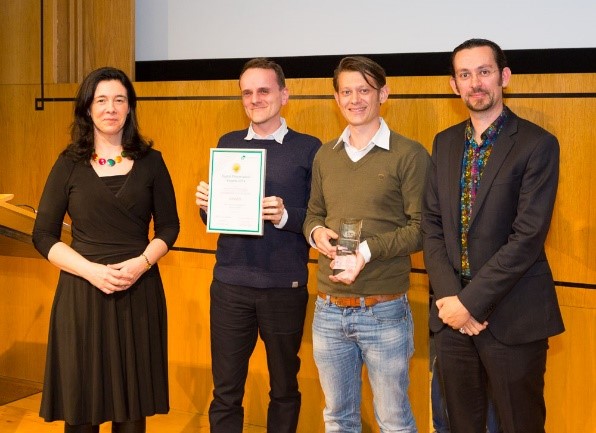
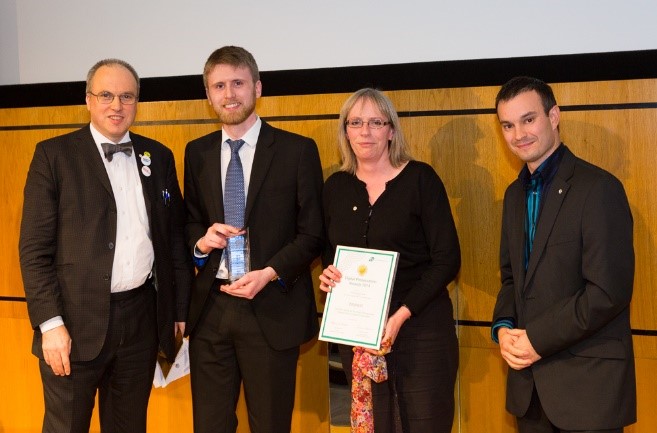
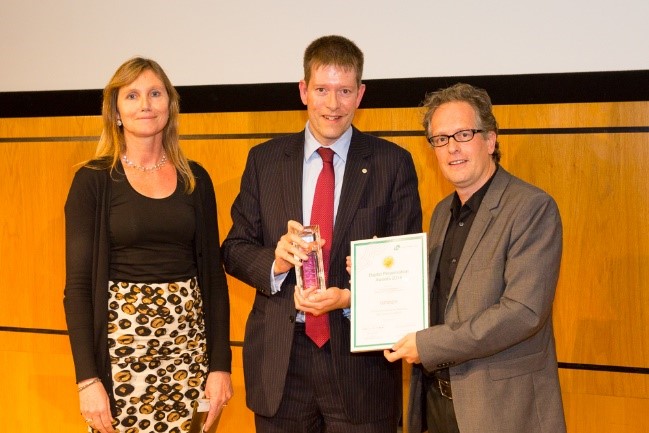
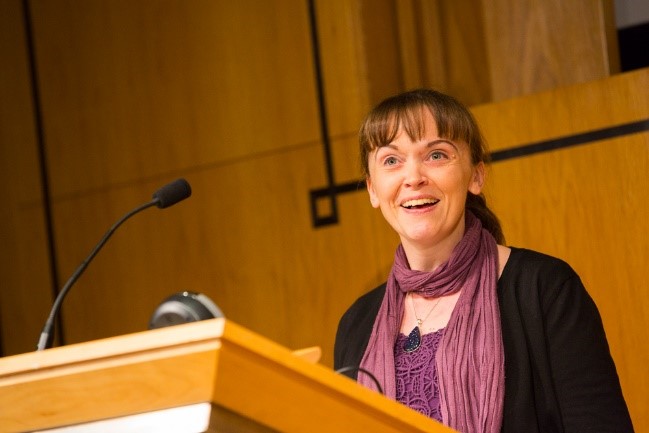
2012 – Archaeology Data Service (Decennial Award for An Outstanding Contribution to Digital Preservation).
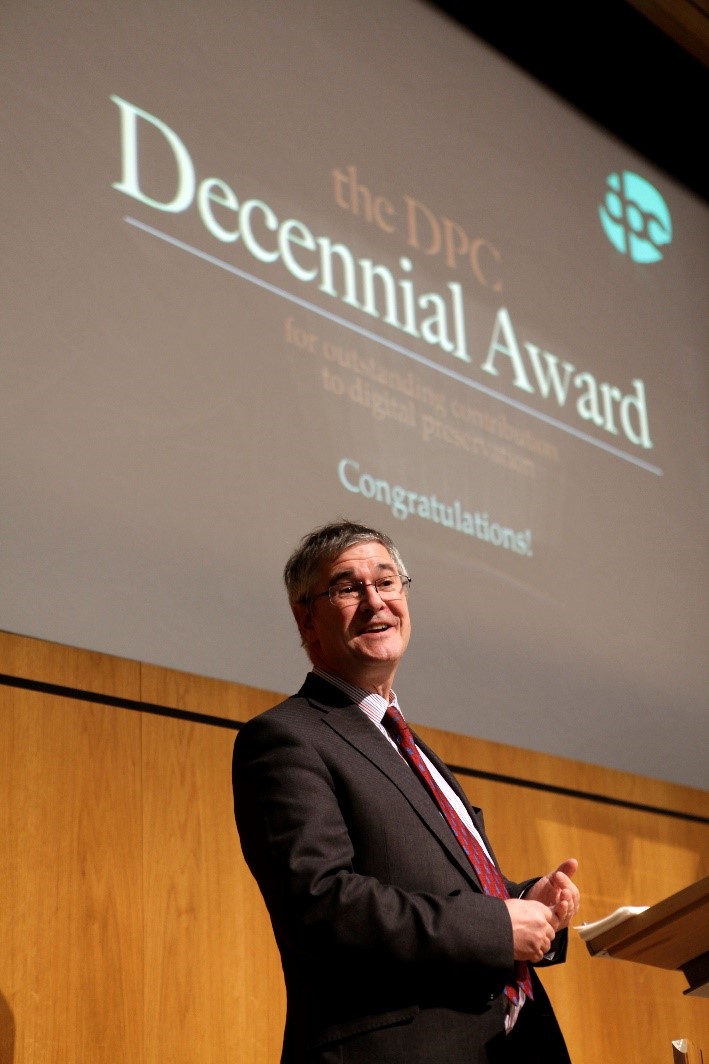
2012 – Digital Preservation Training Programme (Award for Teaching and Communications).
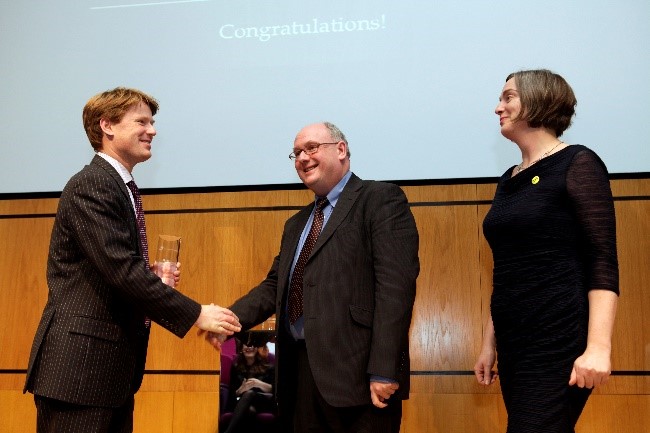
2012 – The PLANETS Project (Award for Research and Innovation).
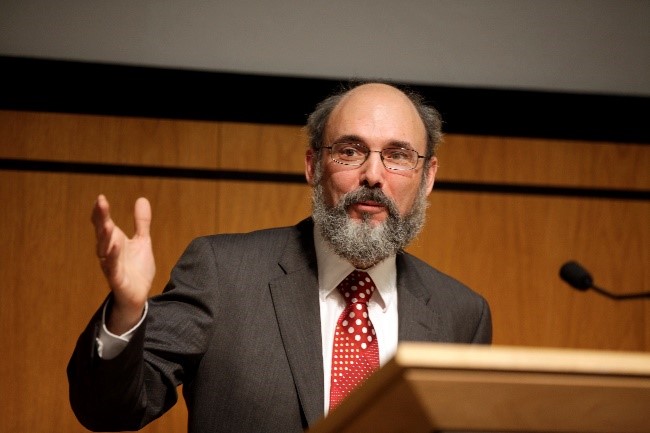
2010 – The Los Alamos National Laboratory and Old Dominion University for the Memento Project.
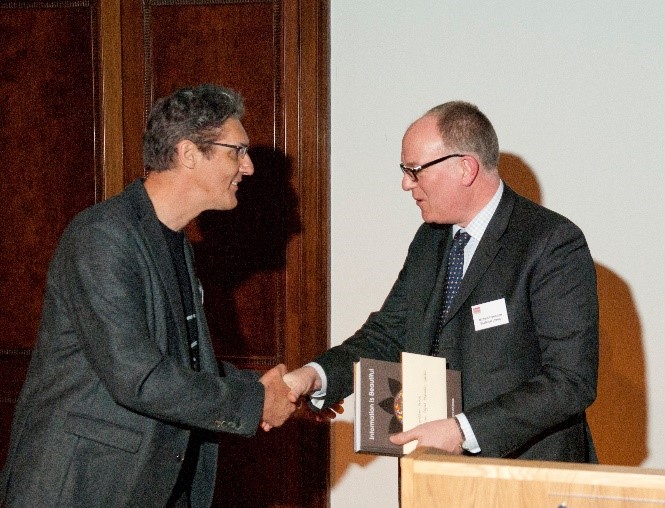
2007 – The National Archives for the PRONOM and DROID projects.
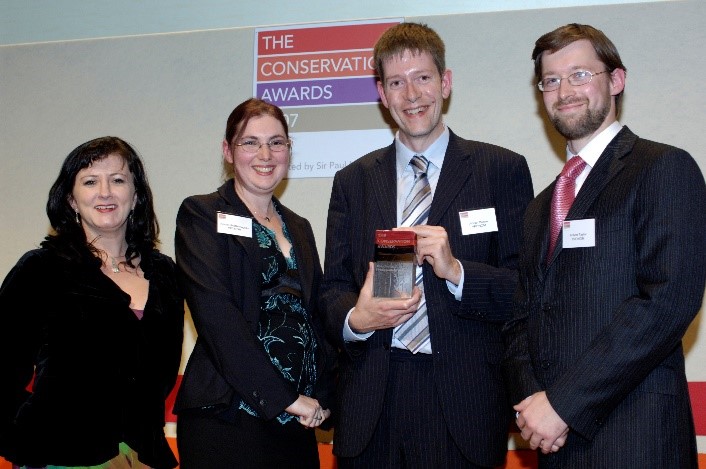
2005 – PREMIS – the Preservation Metadata: Implementation Strategies Working Group.
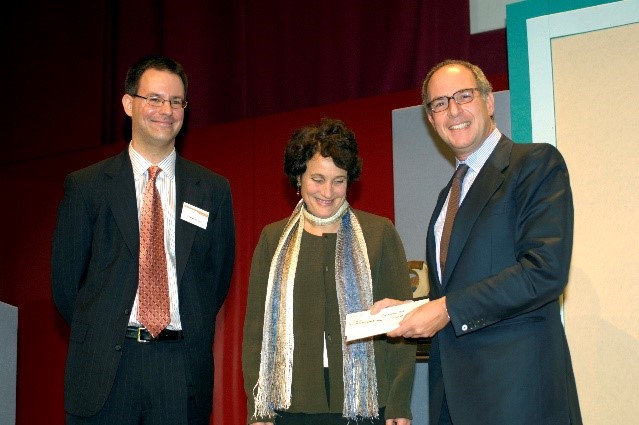
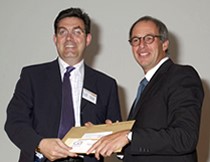
2004 – The National Archives, The Digital Archive project.
Digital Preservation Awards 2014
Meet the winners
Four agencies walked away with awards for their exceptional contribution to ensuring the long-term security of digital collections:
The University of Freiburg and partners with ‘bwFLA Functional Long Term Archiving and Access.’
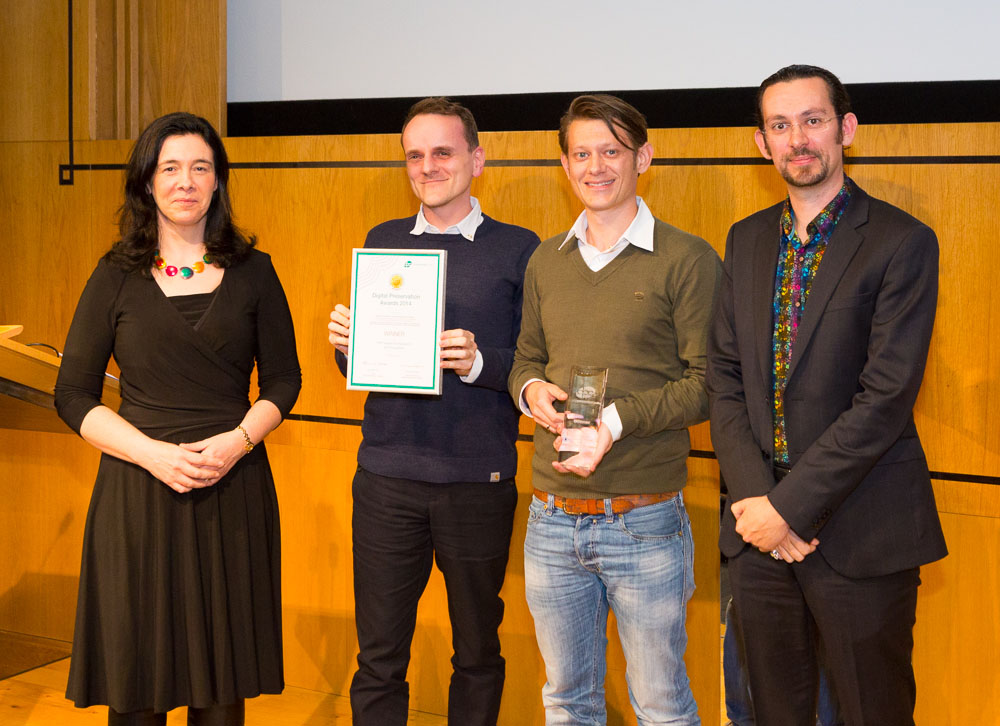 |
2014 winner of the OPF Award for Research and Innovation
|
Alasdair Bachell from the University of Glasgow with ‘Game Preservation in the UK.’
|
|
2014 Winner of the DPC Award for the Most Distinguished Student Work in Digital Preservation
|
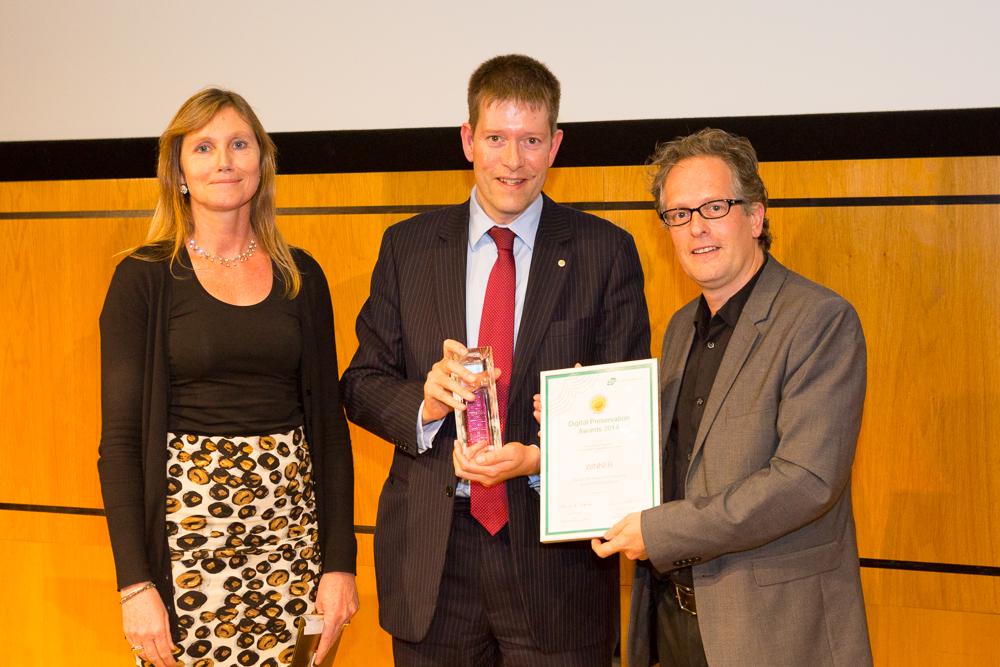 |
2014 Winner of the NCDD Award for Teaching and Communications
|
University of Manchester for their ‘Carcanet Press Email Archive.’
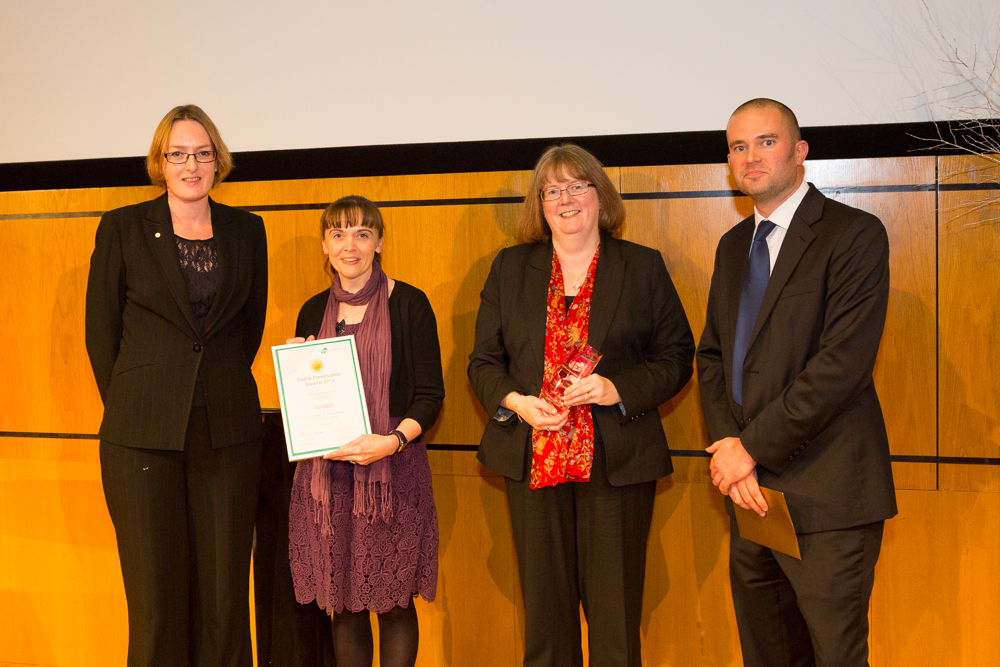 |
2014 Winner of the DPC Award for Safeguarding the Digital Legacy
|
The contributions of nine other exceptional finalists were also marked in the ceremony introduced by Robert Kiley, Head of Digital Services at the Wellcome Library, one of the world's major resources for the study of medical history.
Digital Preservation Awards 2014 Finalists
|
OPF Award for Research and Innovation
|
NCDD Award for Teaching and Communication
|
|
DPC Award for the Most Distinguished Student Work in Digital Preservation
|
DPC Award for Safeguarding the Digital Legacy
|
The DPC extends grateful thanks to our international panel of Judges who made DPA2014 a possibility:
|
Sandra Collins, National Library of Ireland |
Dave Tarrant, ODI |
Marcel Ras, NCDD |
|
Maureen Pennock, British Library |
Tim Gollins, The National Archives (UK) |
Dave Thompson, Wellcome Library |
|
Louise Lawson, Tate |
William Kilbride, DPC |
Paul Wheatley |
|
Rachel Bruce, Jisc |
Ed Fay, OPF |
Manuela Speiser, European Commission |
|
|
Steve Daly, BBC |
|
Digital Preservation Awards 2018: Background and Overview
The Digital Preservation Awards celebrate the excellence and innovation that will help to secure our digital legacy.
They were created in 2004 to raise awareness about digital preservation, providing a rare opportunity to engage in some high-profile advocacy, articulating nuanced messages about how and why one might engage in digital preservation. They enable the DPC to endorse and celebrate outstanding work which may go unrecognized by other communities and which may be little known among the senior managers of the agencies undertaking this work.
In its early iterations (2004, 2005, 2007 and 2010) the DPC sponsored a single award under the auspices of the Conservation Awards. In 2012, to coincide with the 10th anniversary of the Coalition, the DPC organized the Digital Preservation Awards under its own mandate, offering 3 awards – an award for teaching and communications, an award for research and innovation, and a special tenth anniversary award for outstanding contribution to digital preservation. In 2014 a further 2 awards were offered and in 2016 the DPC Fellowship was offered for the first time.
In 2018 the DPC again offers awards in 5 categories, alongside a sixth - ‘Fellowship’ Award:
- The Software Sustainability Institute Award for Research and Innovation which recognizes excellence in practical research and innovation activities. The award includes a cash prize of £1000, a trophy and certificates.
- The DPC Award for Teaching and Communications, recognizing excellence in outreach, training and advocacy. The award includes a cash prize of £1000, a trophy and certificates.
- The National Records of Scotland Award for the Most Distinguished Student Work in Digital Preservation, encouraging and recognizing student work in digital preservation. The prize includes attendance at an international conference, a trophy and a certificate.
- The National Archives Award for Safeguarding the Digital Legacy, which celebrates the practical application of preservation tools to protect at-risk digital objects. The award includes a cash prize of £1000, a trophy and certificates.
- The Open Data Institute Award for the Most Outstanding Digital Preservation Initiative in Commerce, Industry and the Third sector, encouraging and recognizing the adoption of digital preservation tools and approaches in institutions which are not explicitly memory institutions. The award includes a cash prize of £1000, a trophy and certificates.
In addition, winners and finalists will receive a print quality logo for reproduction on websites or stationery. All applicants will receive practical commentary on their nomination including comments from the ‘public vote’. Informal feedback suggests that this feedback has been widely re-used by applicants in grant applications and curricula vitae.
The ceremony for the Digital Preservation Awards took place in Amsterdam on the evening of World Digital Preservation Day, Thursday 29th November 2018.
Digital Preservation Awards 2020
The Digital Preservation Awards winners have been revealed!
The Digital Preservation Awards 2020 have been presented to our worthy winners on World Digital Preservation Day (WDPD20).
Watch the ceremony as congratulate the winners of the:
- The International Council on Archives Award for Collaboration and Cooperation
- The Software Sustainability Institute Award for Research and Innovation
- The Dutch Digital Heritage Network Award for Teaching and Communications
- The National Records of Scotland Award for the Most Distinguished Student Work in Digital Preservation
- The National Archives (UK) Award for Safeguarding the Digital Legacy
- The DPC Award for the Most Outstanding Digital Preservation Initiative in Commerce, Industry and the Third sector
- The Digital Preservation Coalition Fellowship
Read about the Digital Preservation Awards winners
Watch the Live Stream of the Awards Presentations below:
Find out about the Digital Preservation Awards 2020 Finalists
Drawing together the finalists' presentatations from the recent #WeMissiPRES event in September, hear our Digital Preservation Awards judges as they introduce and reflect on the excellent, inspiring and innovative people and projects they have encountered throughout the awards process.
Watch and learn about each of our incredible finalists as they tell us more about their work.
See all Digital Preservation Awards 2020 Finalists
The Digital Preservation Awards are made possible by the expertise and support provided by our international panel of Judges, and funding from our sponsors.
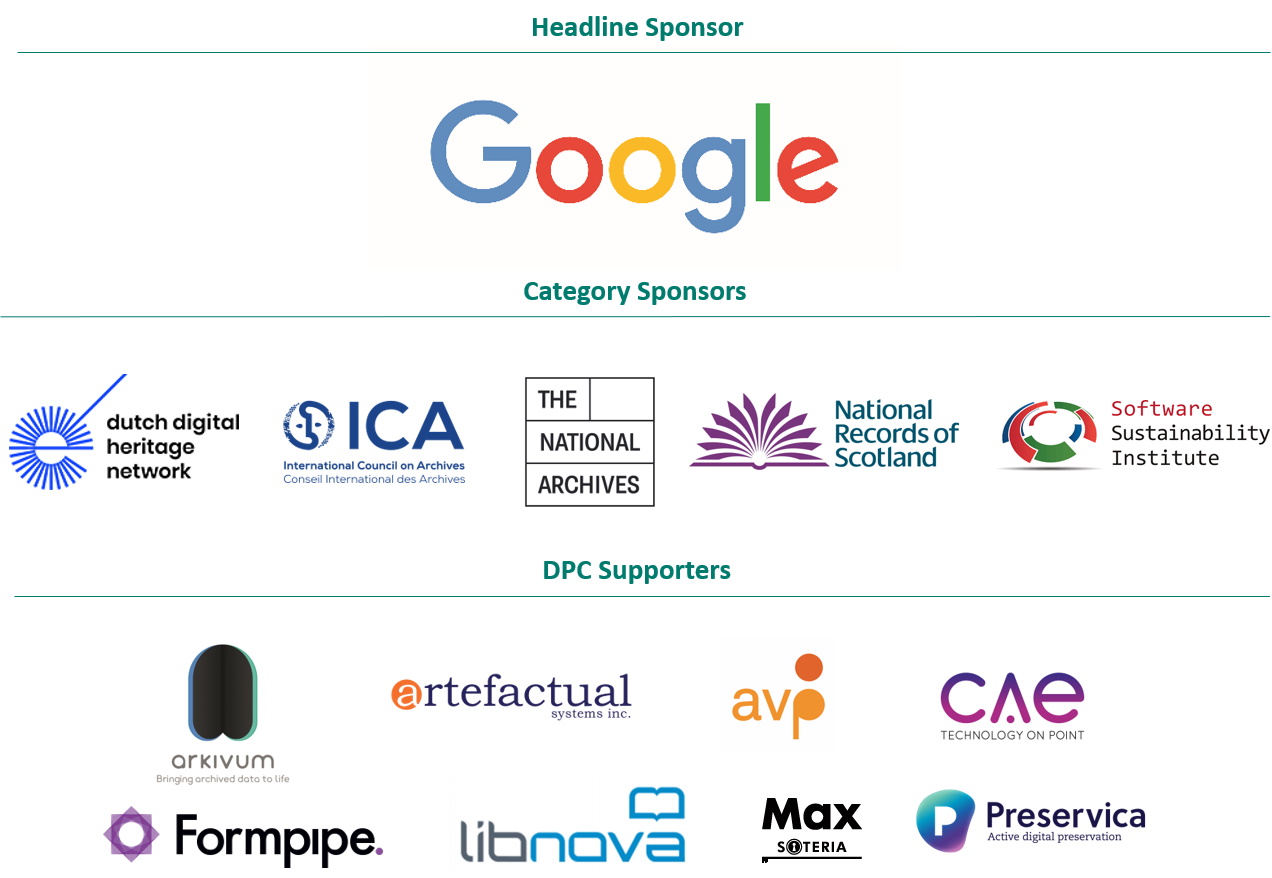
Digital Preservation Awards 2024
The Digital Preservation Awards are back for 2024! The awards celebrate the work of our welcoming and inclusive global community which works together to bring about a sustainable future for our digital assets. The awards are held every two years.
Created in 2004 to raise awareness about digital preservation, the Digital Preservation Awards provide a rare opportunity to engage in high-profile advocacy, articulating nuanced messages about how and why one might engage in digital preservation. They enable the DPC, acting on behalf of the global digital preservation community, to endorse and celebrate outstanding work which may go unrecognized by others, and which may be little known among the senior managers of the agencies sponsoring this work. Therefore, nominations which have received recognition through other schemes such as the NDSA Excellence Awards are unlikely to be recognized again by the Digital Preservation Awards.
In its early iterations (2004, 2005, 2007 and 2010) the DPC sponsored a single award under the auspices of the Conservation Awards. In 2012, to coincide with the 10th anniversary of the Coalition, the DPC organized the Digital Preservation Awards under its own mandate, offering 3 awards. In 2014 a further 2 awards were offered and, in 2016, the DPC Fellowship was introduced for the first time. And in 2020 a new category allowing for an explicit celebration of collaboration was added. In 2022, we marked the DPC’s 20th Anniversary with another award which celebrates a continuing, substantial and impactful contribution to the digital preservation community in any form, over the preceding 20 years.
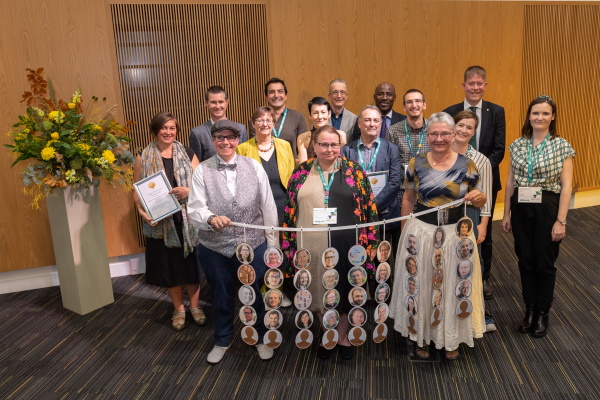
The Digital Preservation Awards winners from 2022 have been enjoying a greater profile for their work.
Back row (L-R): Matthew Addis and Joao Fernandes (ARCHIVER Project), Neil Beagrie (DPC Fellow), Emmanuel Modozie (NCTR), Adrian Brown (DPC Fellow); Middle row (L-R): Sarah Cook (on behalf of sasha arden), Sarah Higgins and Sally McInnes (Learning through Doing), Teo Redondo (ARCHIVER Project), Panagiotis Papageorgiou (archeological virtual reconstructions), Clare Lanigan and Lorraine Grimes (Archiving Reproductive Health); Front row (L-R): Micky Lindlar, Karin Bredenberg and Eld Zierau (PREMIS Editorial Committee)
Now in 2024, the Digital Preservation Awards offers:
-
The International Council on Archives Award for Collaboration and Cooperation, celebrating significant collaboration across institutional, professional, sectoral and geographical boundaries which have had a demonstrable and positive impact on digital preservation since the last prize round (i.e., completed between August 2022 and July 2024). The award includes a cash prize of £1000, a trophy and certificate(s).
-
The Digital Repository of Ireland Award for Research and Innovation, recognizing excellence in practical research and innovation activities since the last prize round (i.e., completed between August 2022 and July 2024). The prize in this category consists of a trophy to be retained by the recipient, certificates for participating individuals, and a cash prize of £1000 payable to the lead nominee’s institution.
-
The Netwerk Digitaal Erfgoed Award for Teaching and Communications, recognizing excellence in outreach, training and advocacy since the last prize round (i.e., completed between August 2022 and July 2024). The prize in this category consists of a trophy to be retained by the recipient, certificates for participating individuals, and a cash prize of £1000 payable to the lead nominee’s institution.
-
The CLOCKSS Award for the Most Distinguished Student Work in Digital Preservation, encouraging and recognizing student work in digital preservation completed in the period August 2022 and July 2024. The prize in this category consists of a trophy to be retained by the recipient’s institution, certificates for participating individuals, and a travel grant covering the costs of attendance at an international conference in 2025.
-
The National Archives (UK) Award for Safeguarding the Digital Legacy, celebrating the practical application of preservation tools to protect at-risk digital objects (completed in the period August 2022 and July 2024). The prize in this category consists of a trophy to be retained by the recipient, certificates for participating individuals, and a cash prize of £1000 payable to the lead nominee’s institution.
-
The Research Data Alliance Award for the Most Outstanding Digital Preservation Initiative in Commerce, Industry and the Third Sector, encouraging and recognizing the adoption of digital preservation tools and approaches in an organization that is not explicitly a memory institution, completed between August 2022 and July 2024. The prize in this category consists of a trophy to be retained by the recipient, certificates for participating individuals, and a cash prize of £1000 payable to the lead nominee’s organization.
-
The DPC Fellowship Award, in recognition of a substantial, generous and distinguished contribution to securing our digital legacy. Nominations are not sought for DPC Fellowship. Instead the membership of the DPC will be invited to make confidential recommendations of individuals they think meet this description.
Winners and finalists will receive a print quality logo for reproduction on websites or stationery. All nominees will receive practical commentary on their nomination including comments from the ‘public vote’. Informal feedback suggests that this feedback has been widely re-used by nominees in grant applications and curricula vitae.
The exciting awards process will culminate in a presentation at the iPres 2024 Conference on Monday 16 September 2024.
We are very grateful to our sponsors and DPC Supporters for their generous contributions which enable the Digital Preservation Awards to take place:
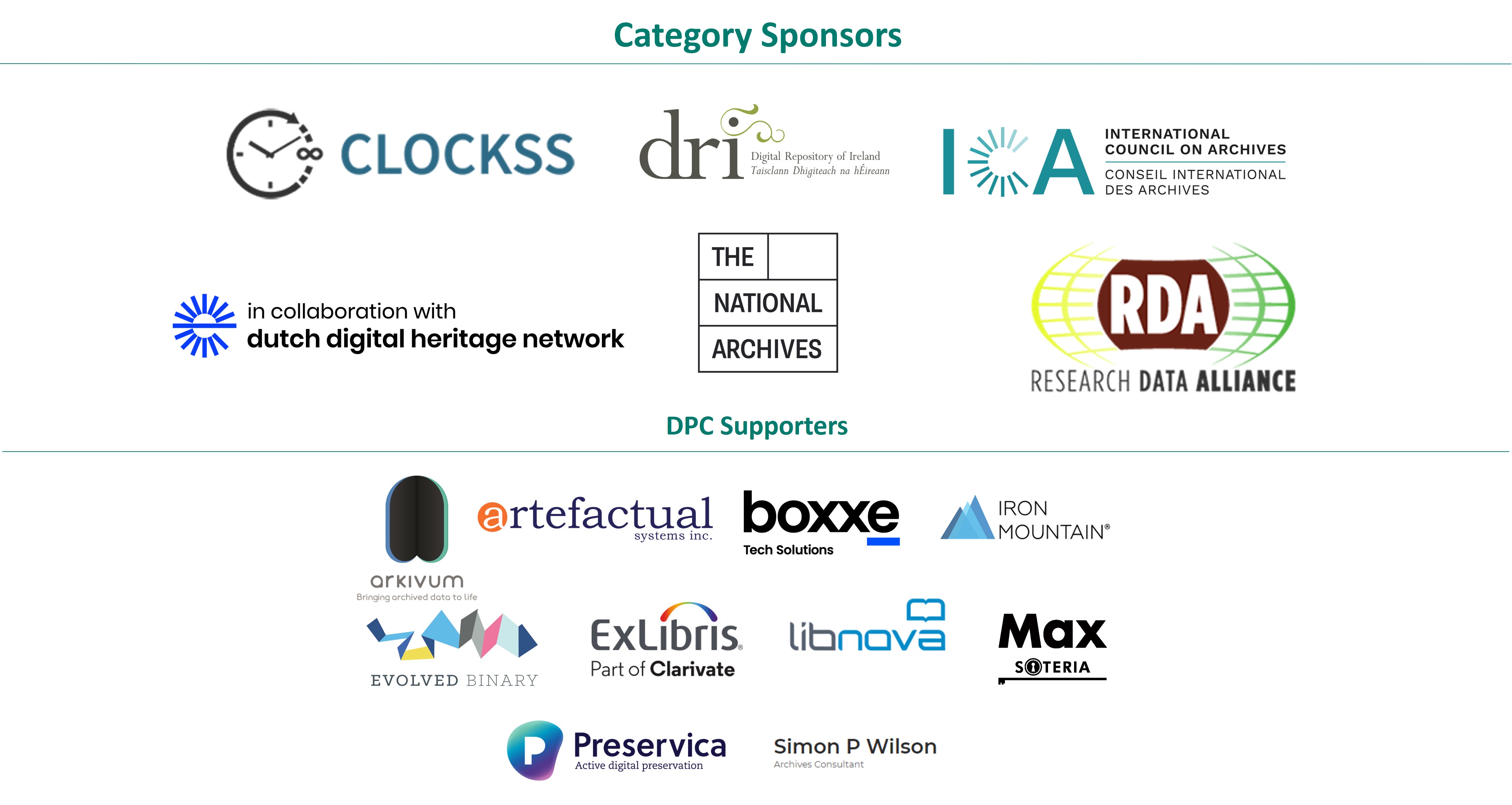
If your organization would like to sponsor the Digital Preservation Awards please email This email address is being protected from spambots. You need JavaScript enabled to view it..































































































































